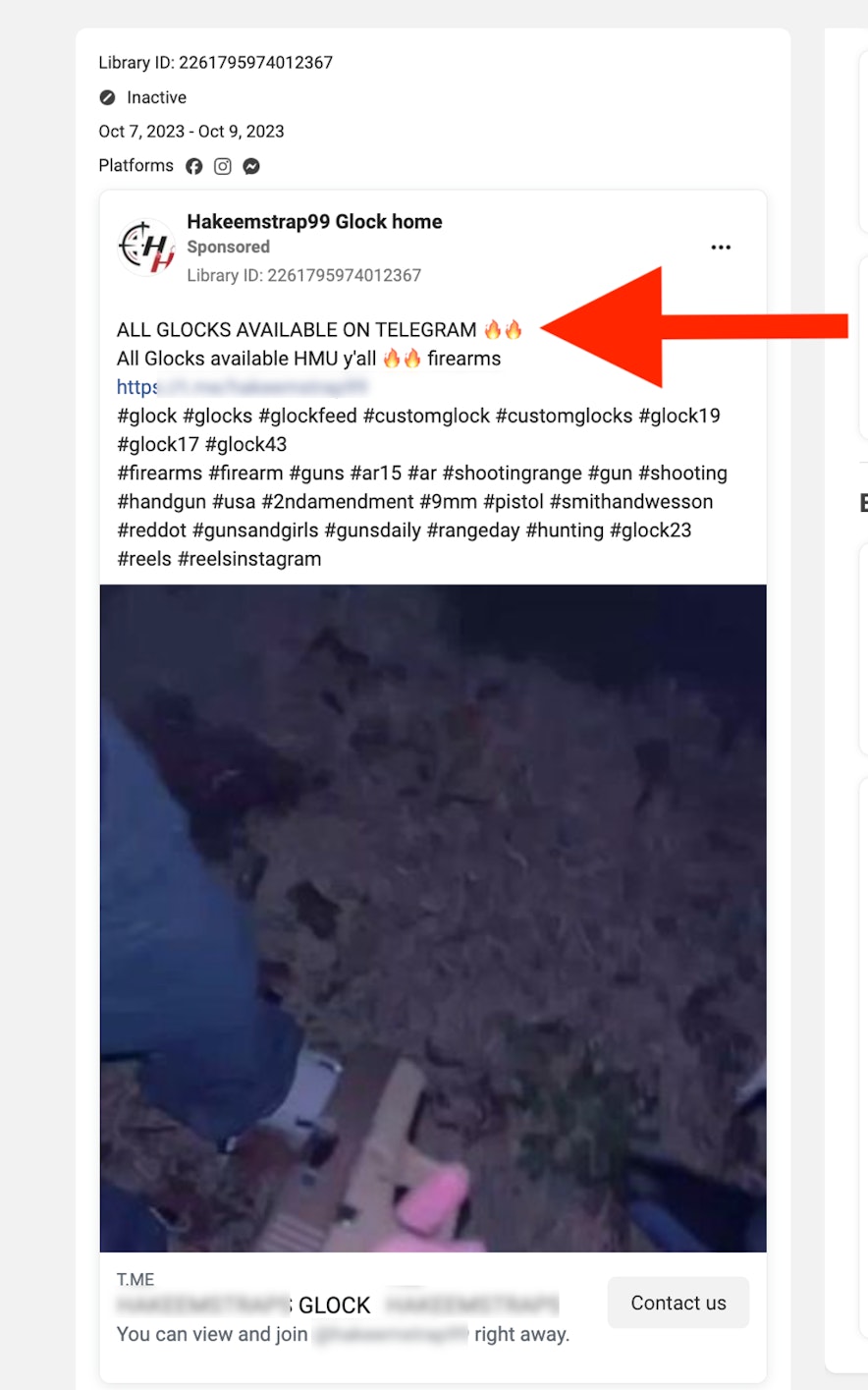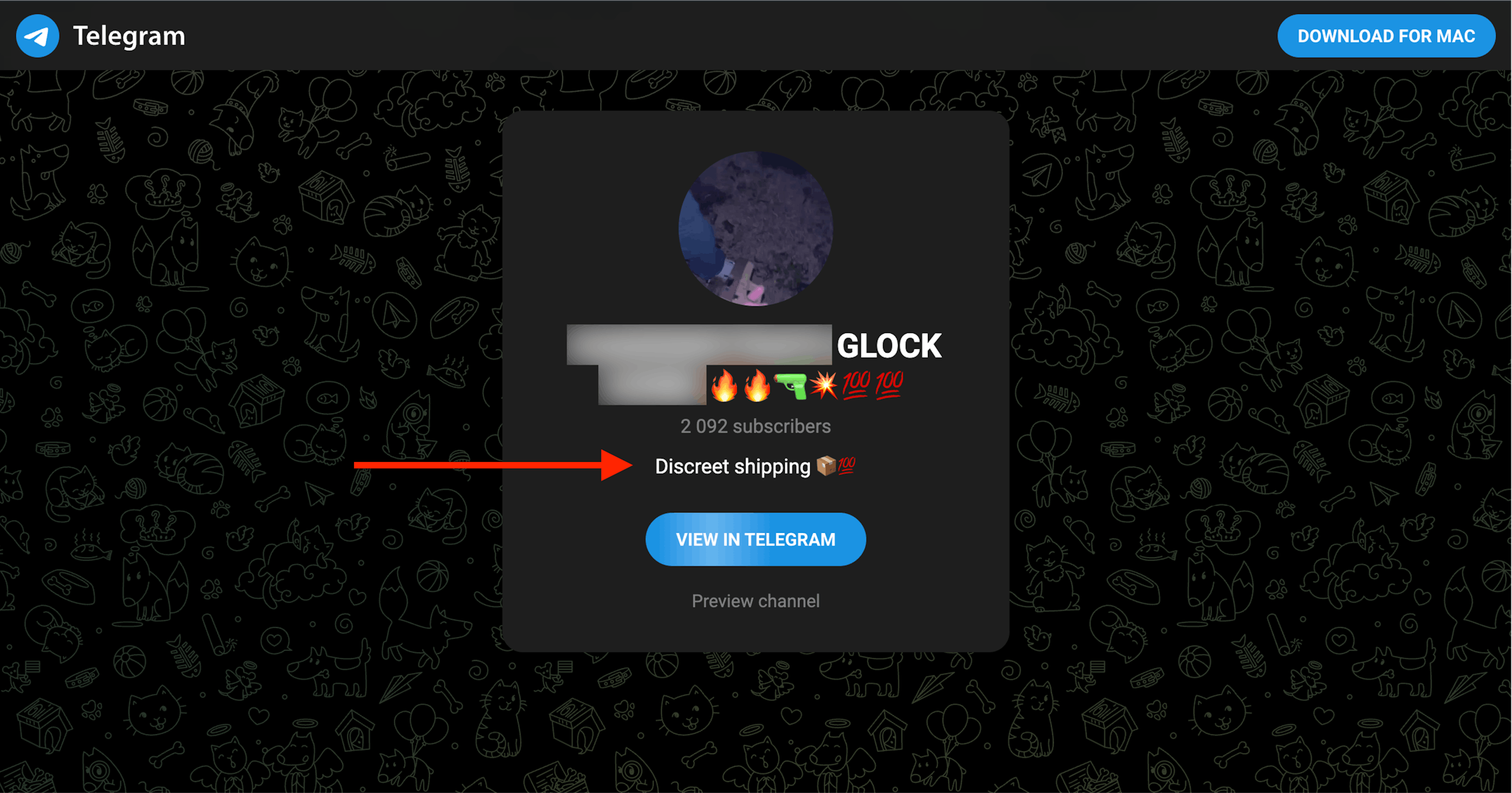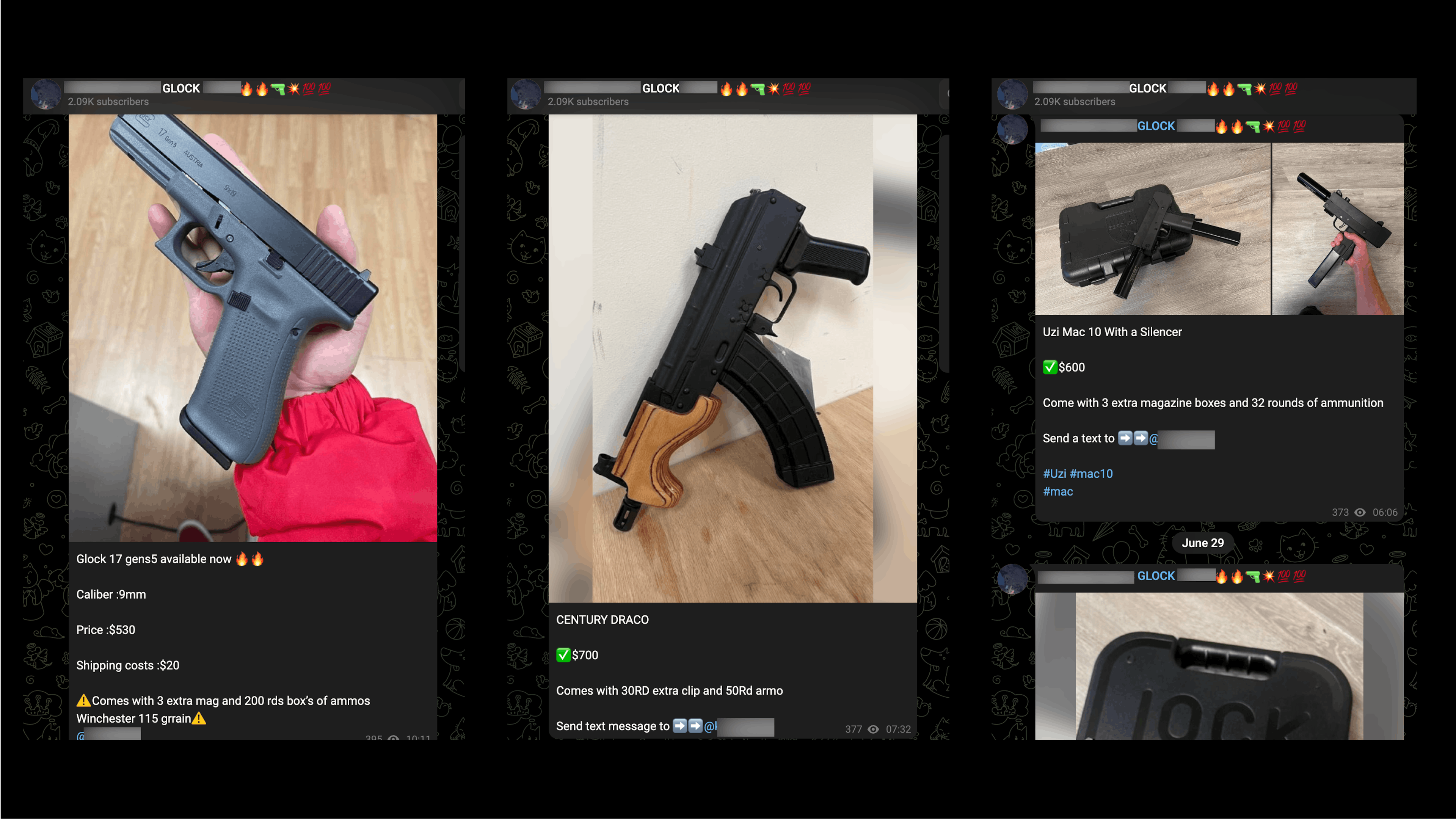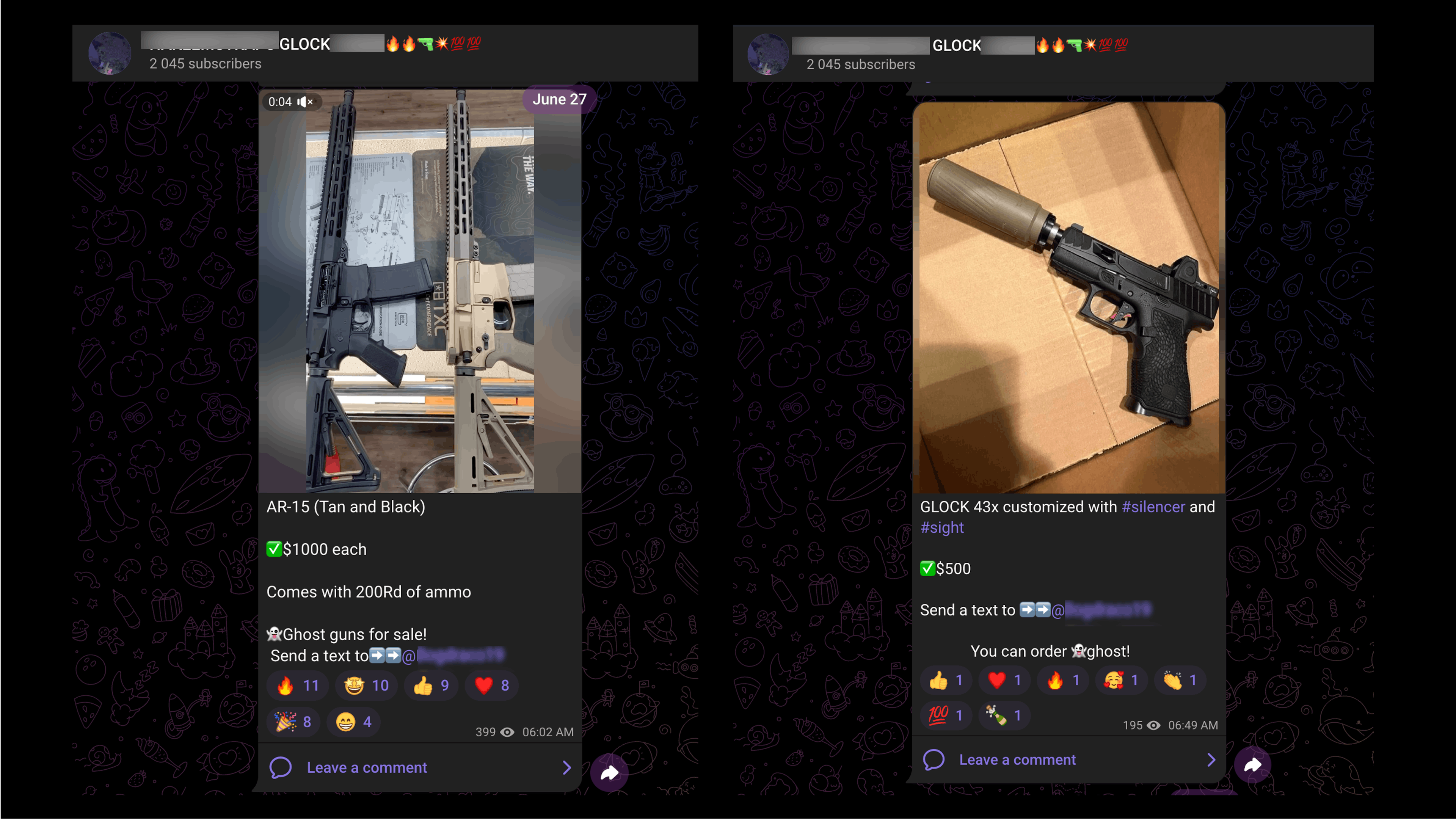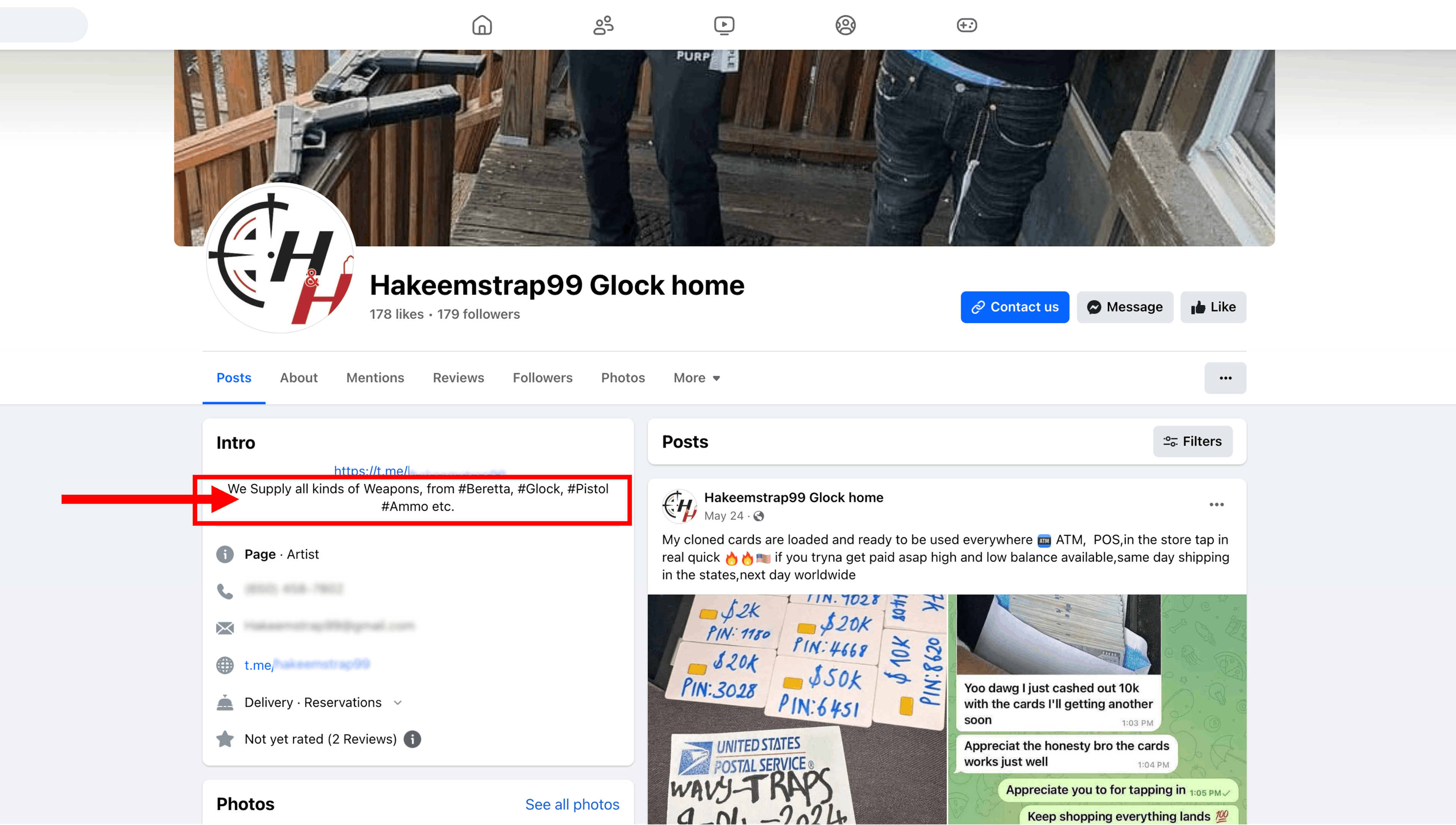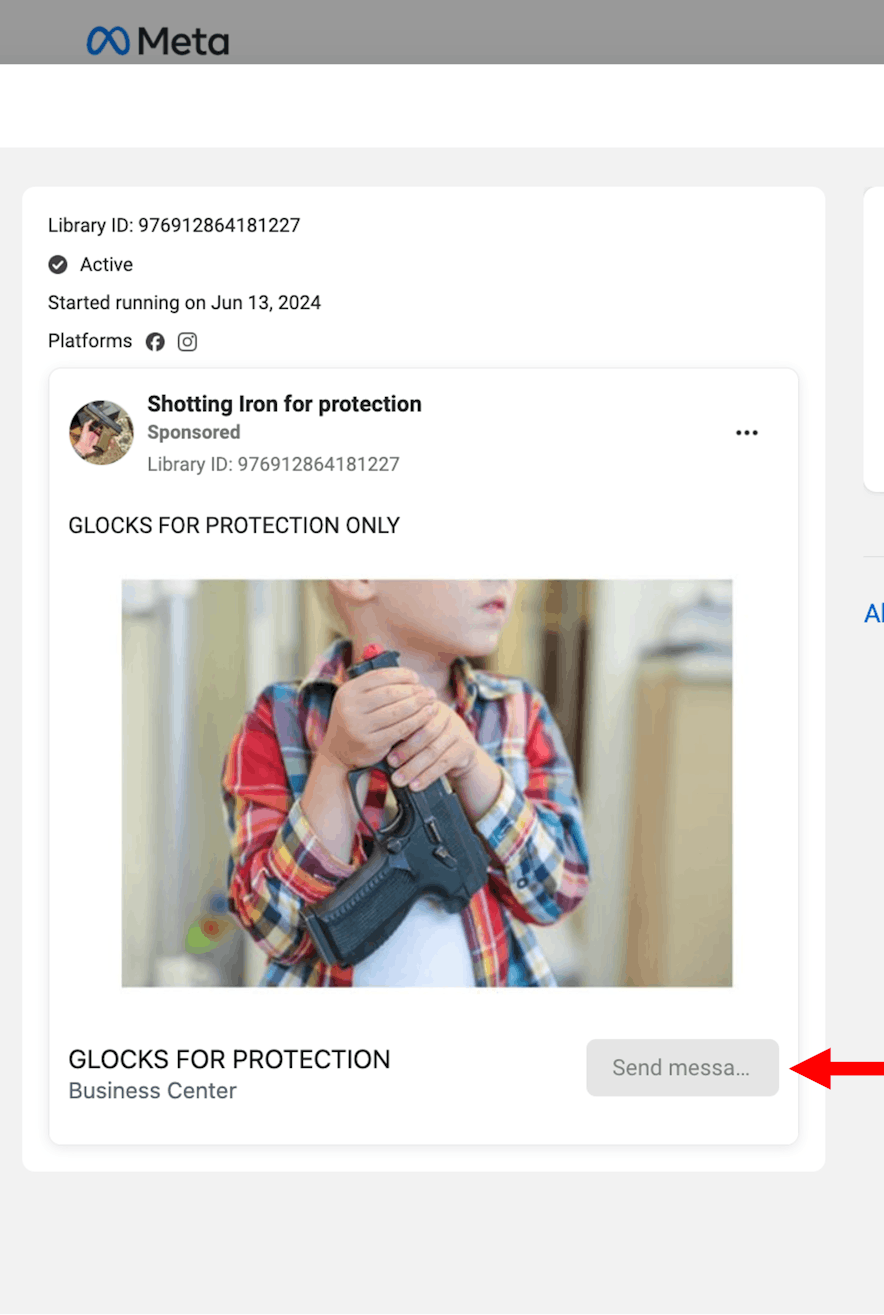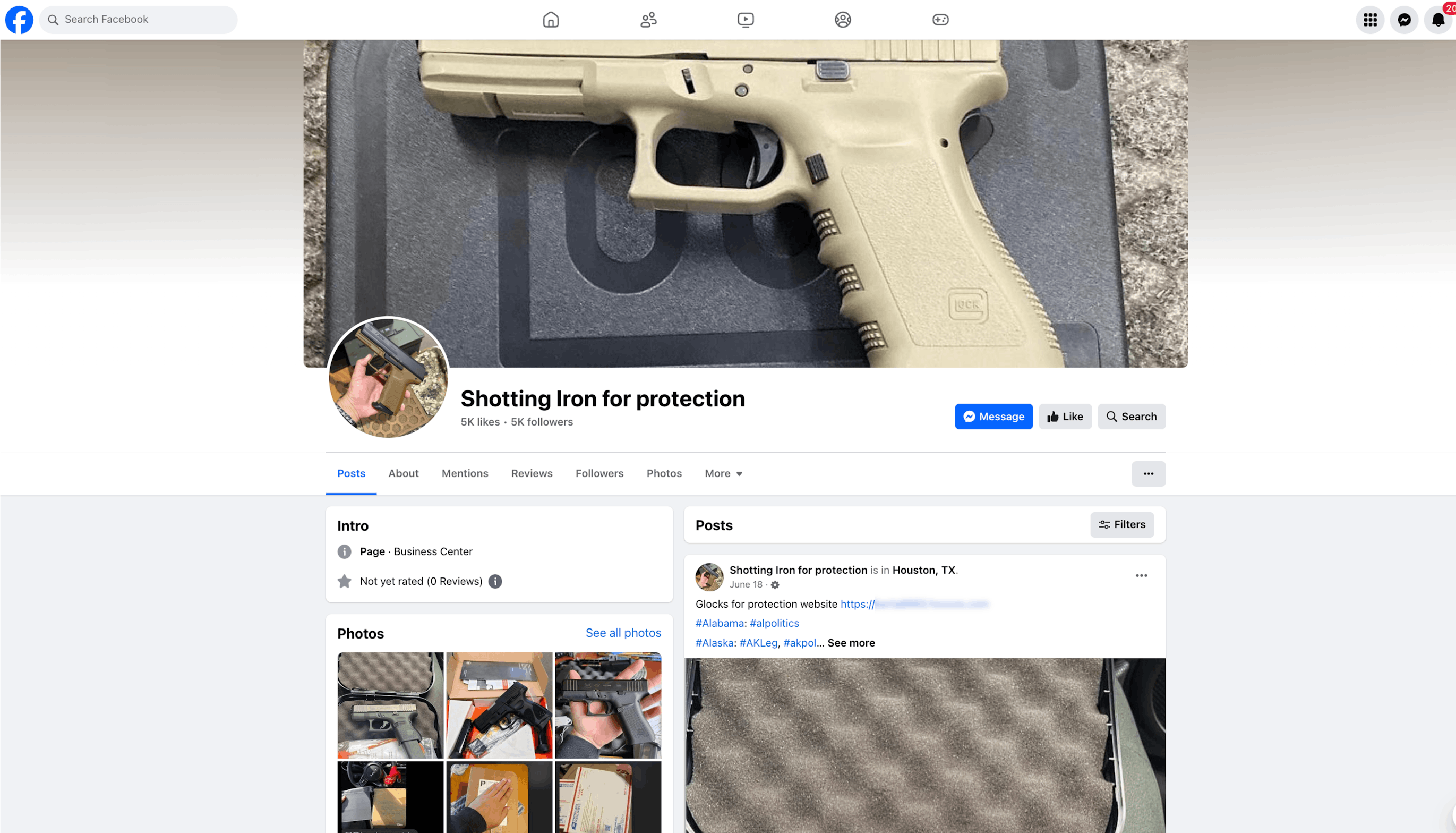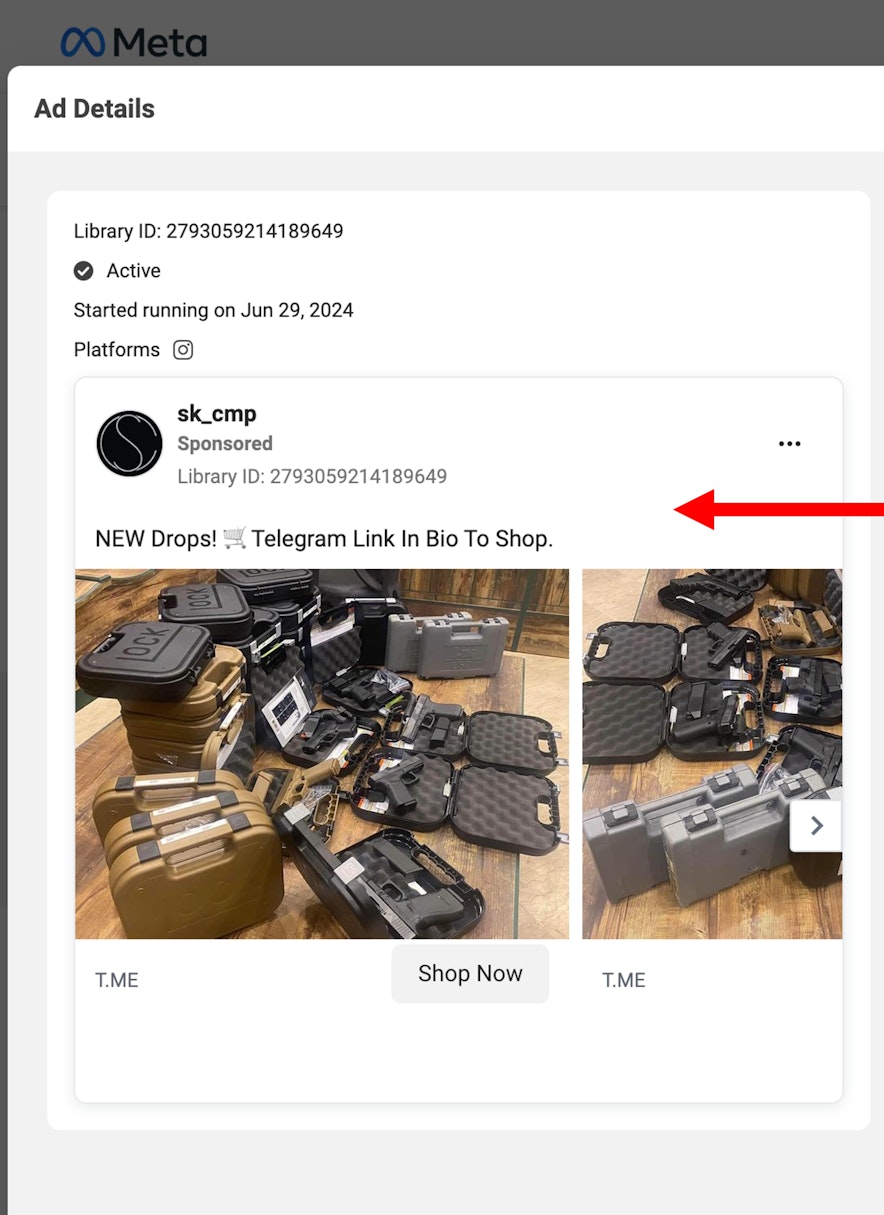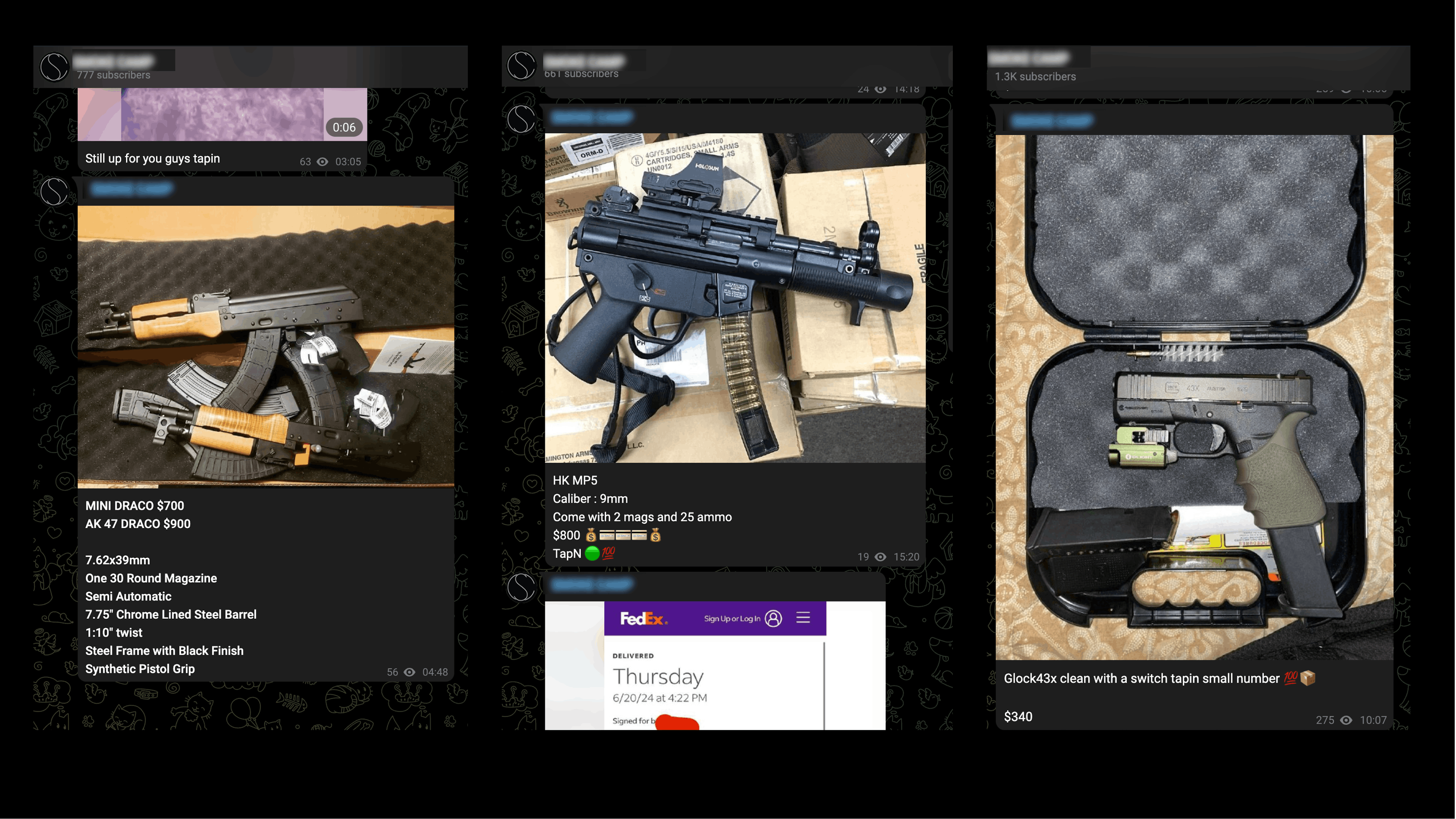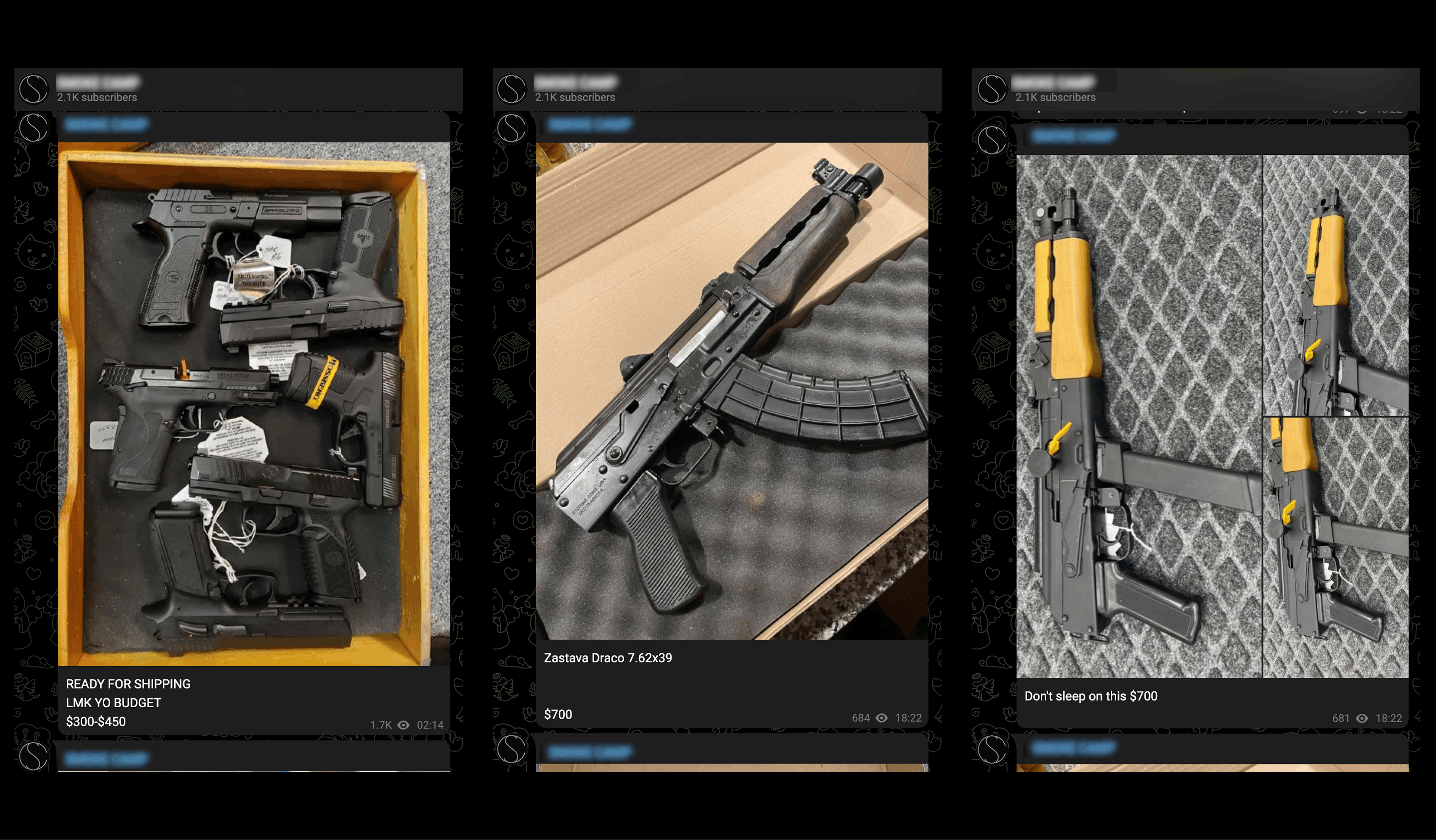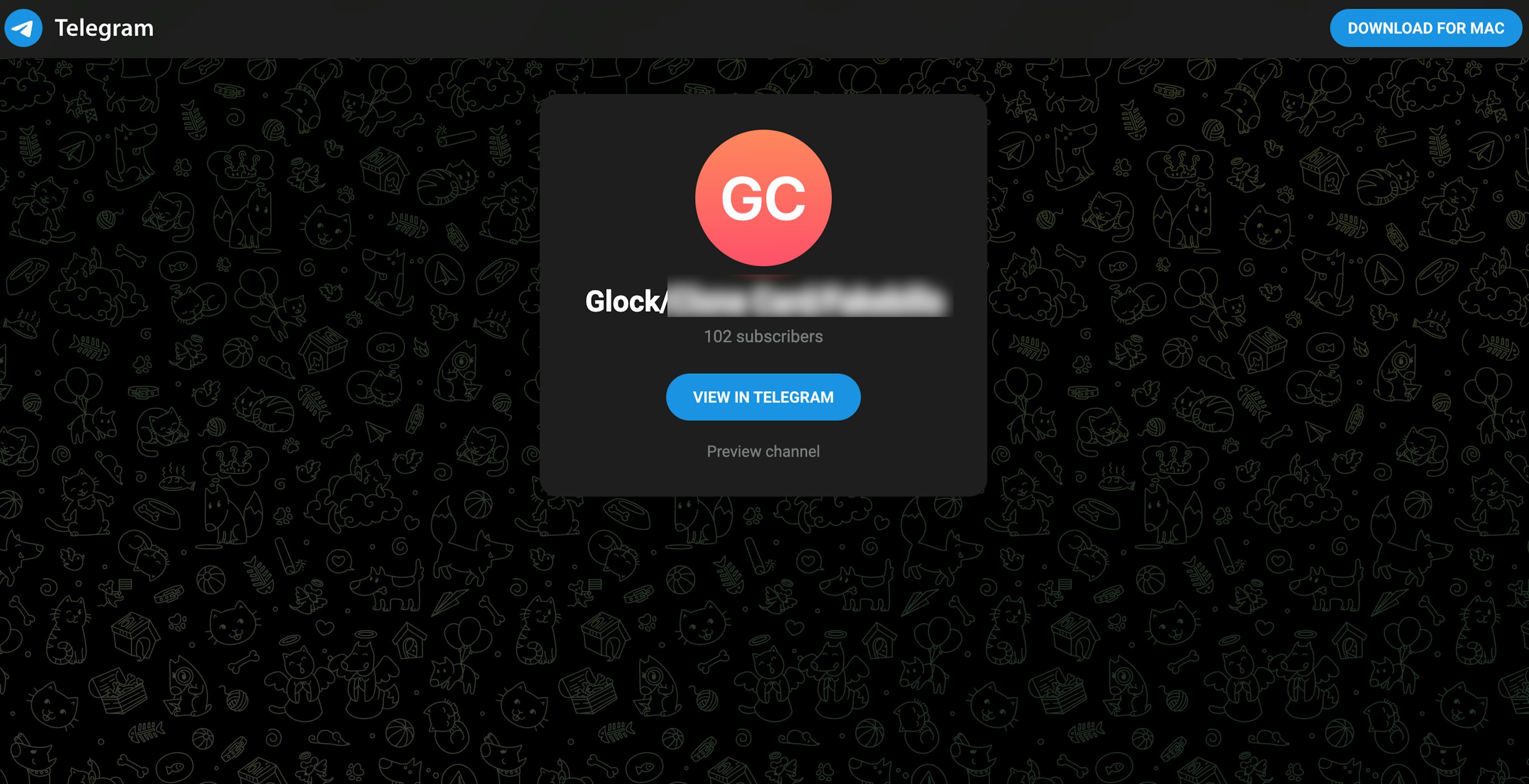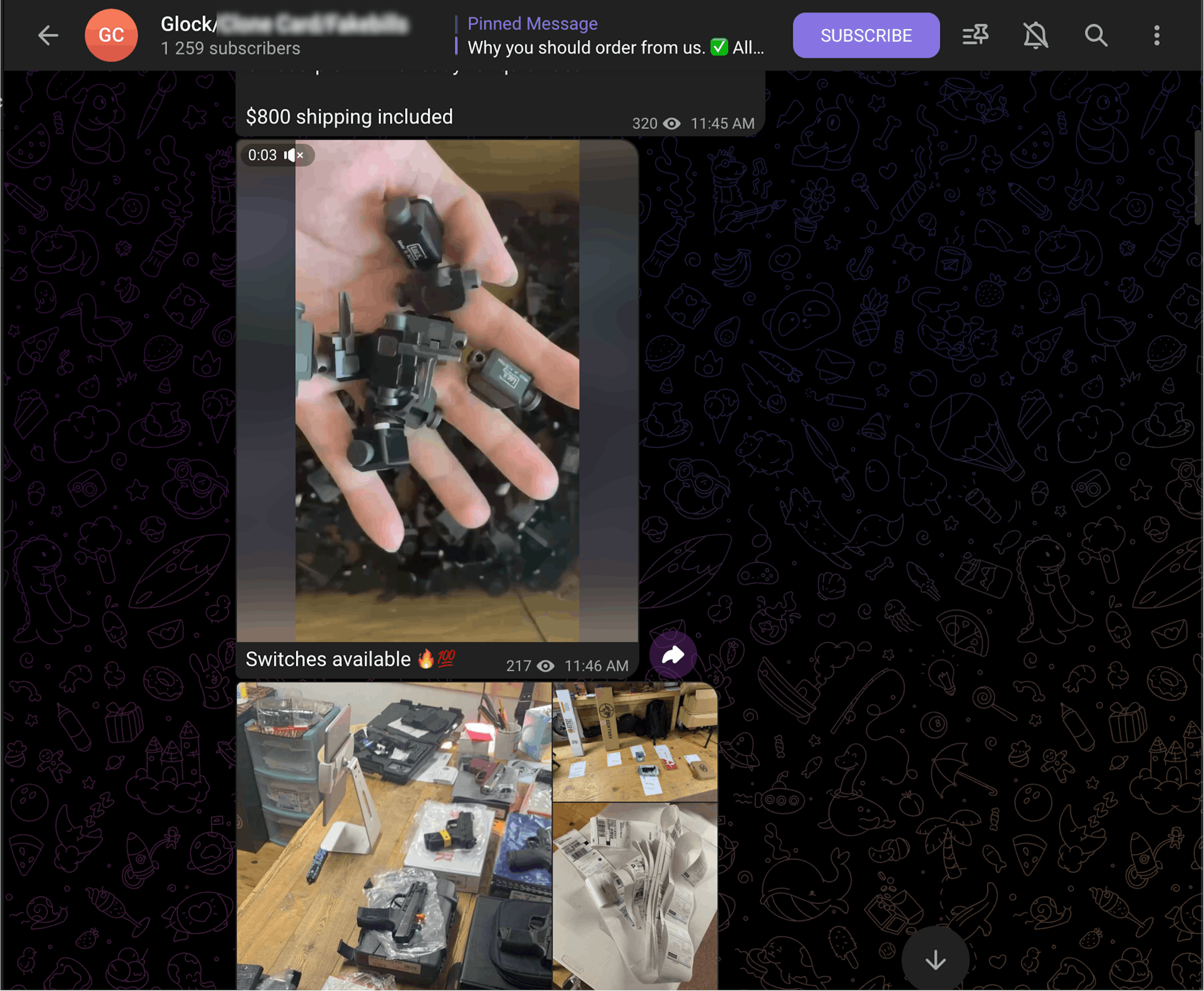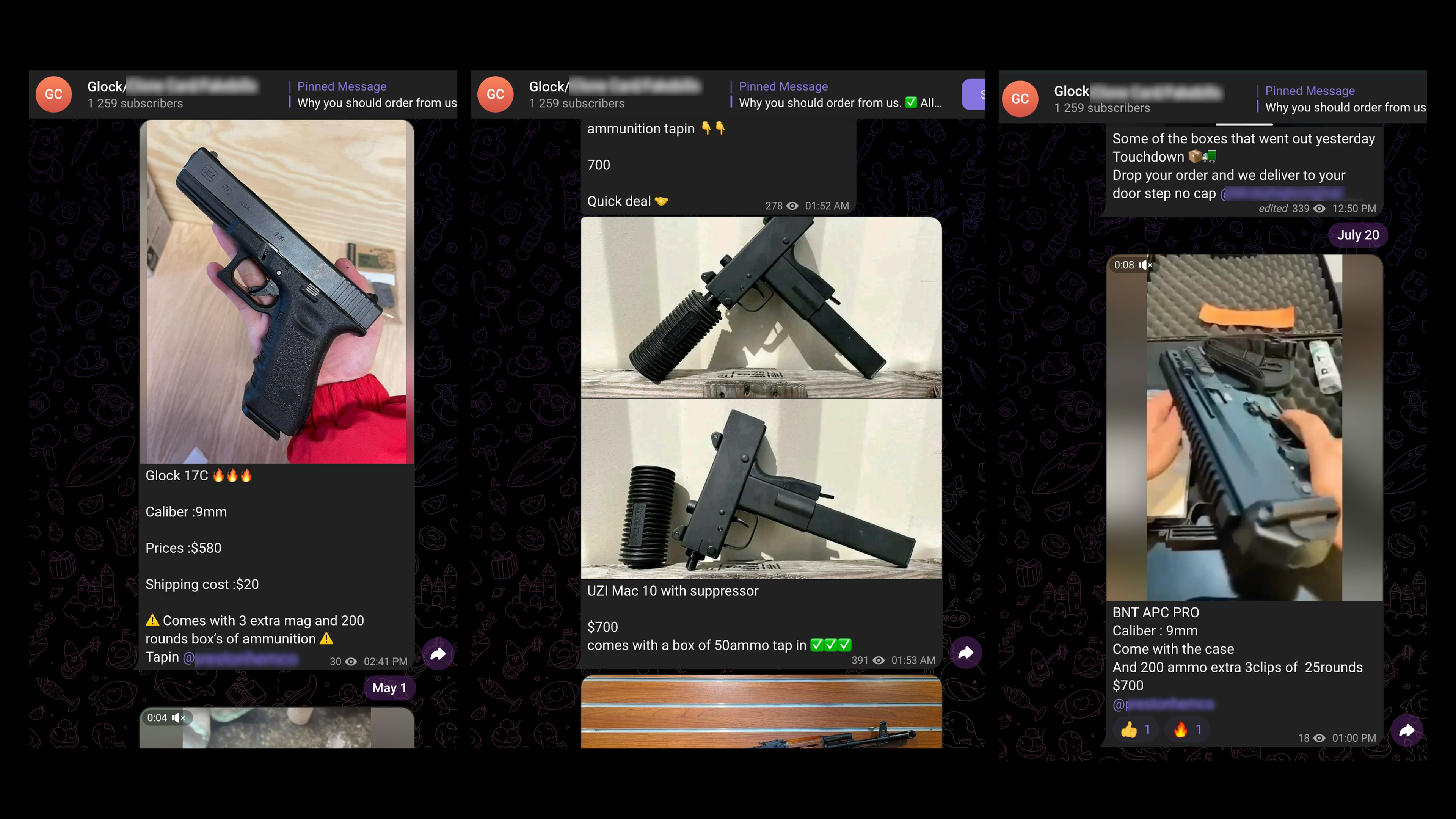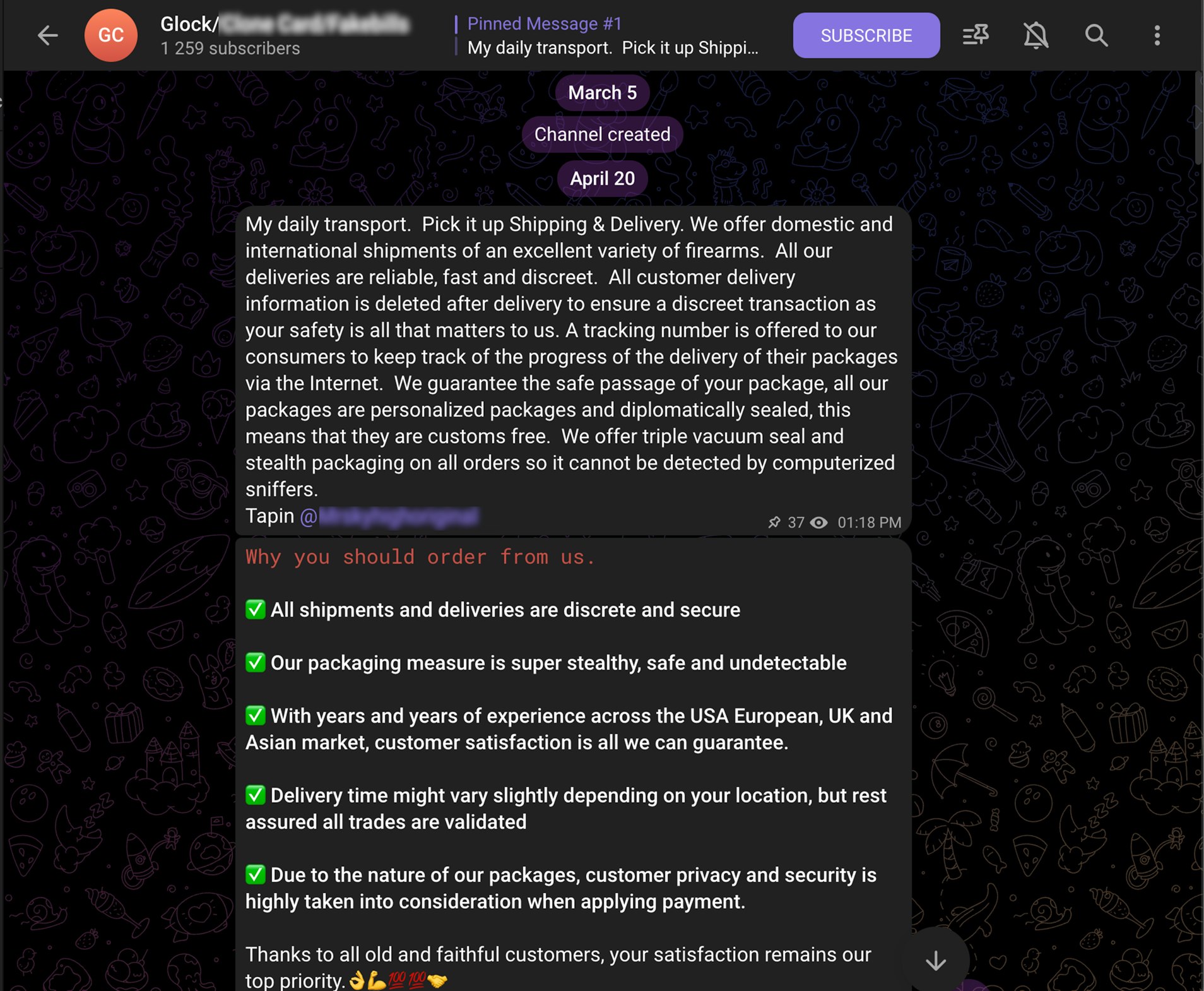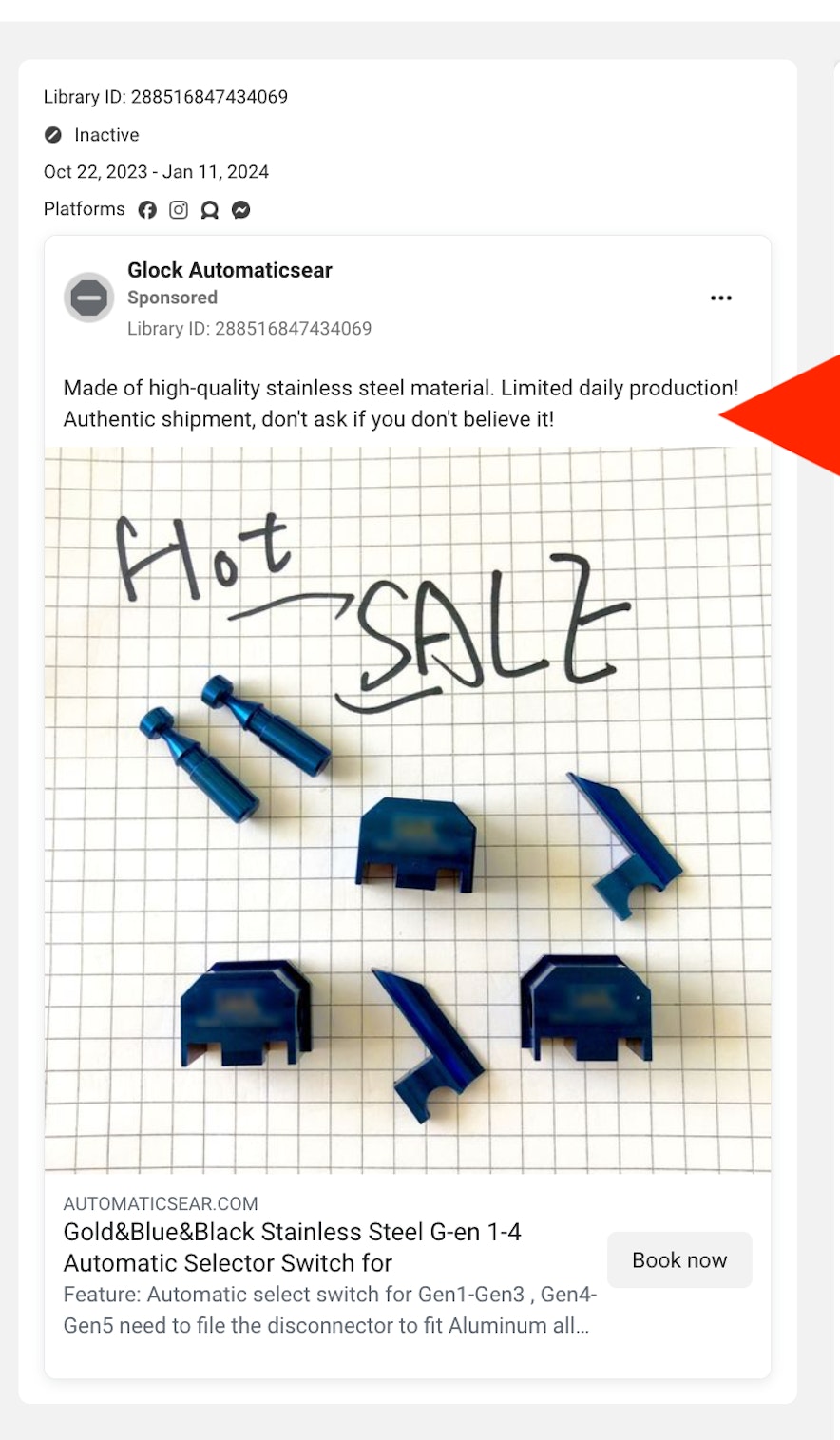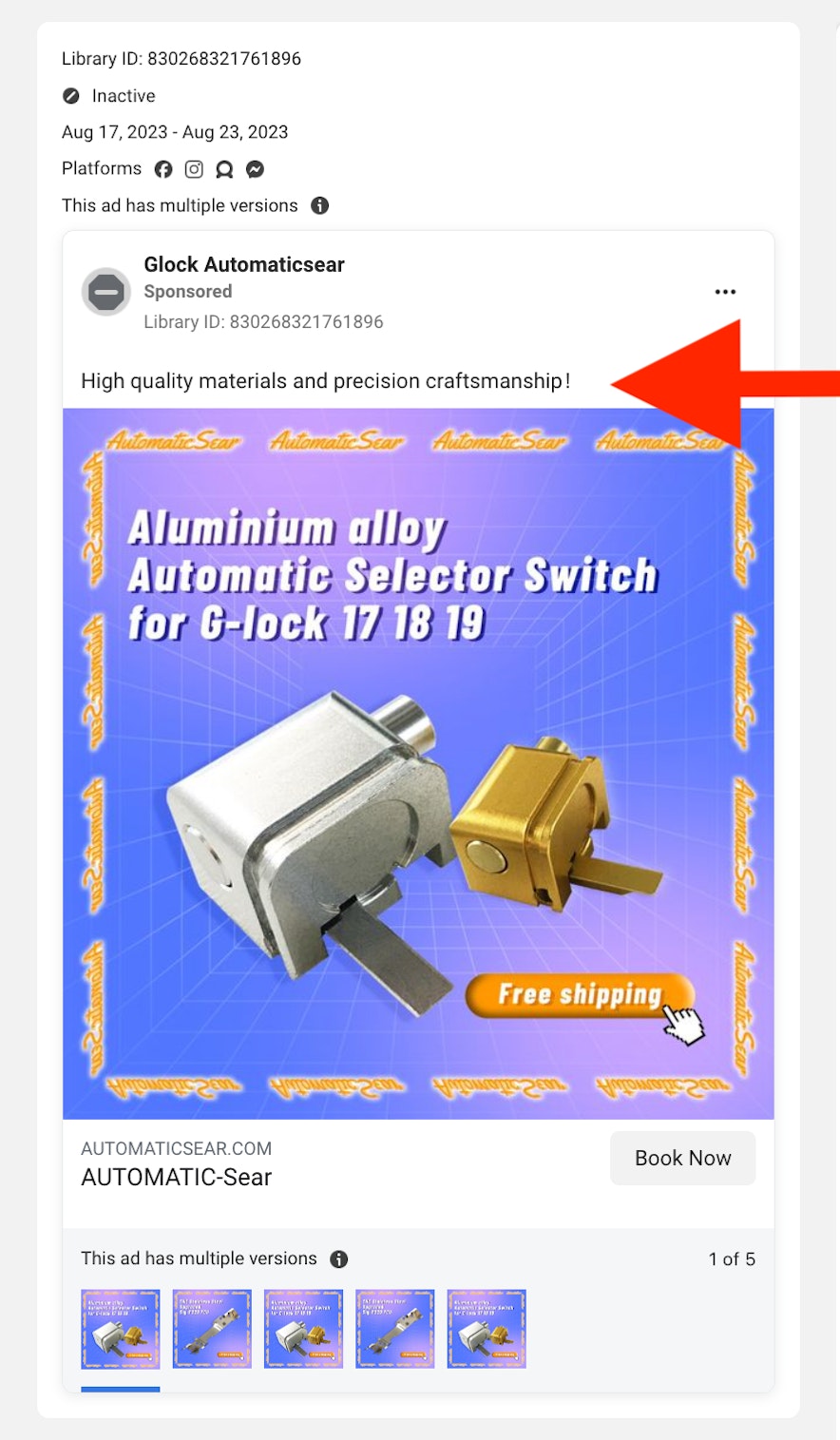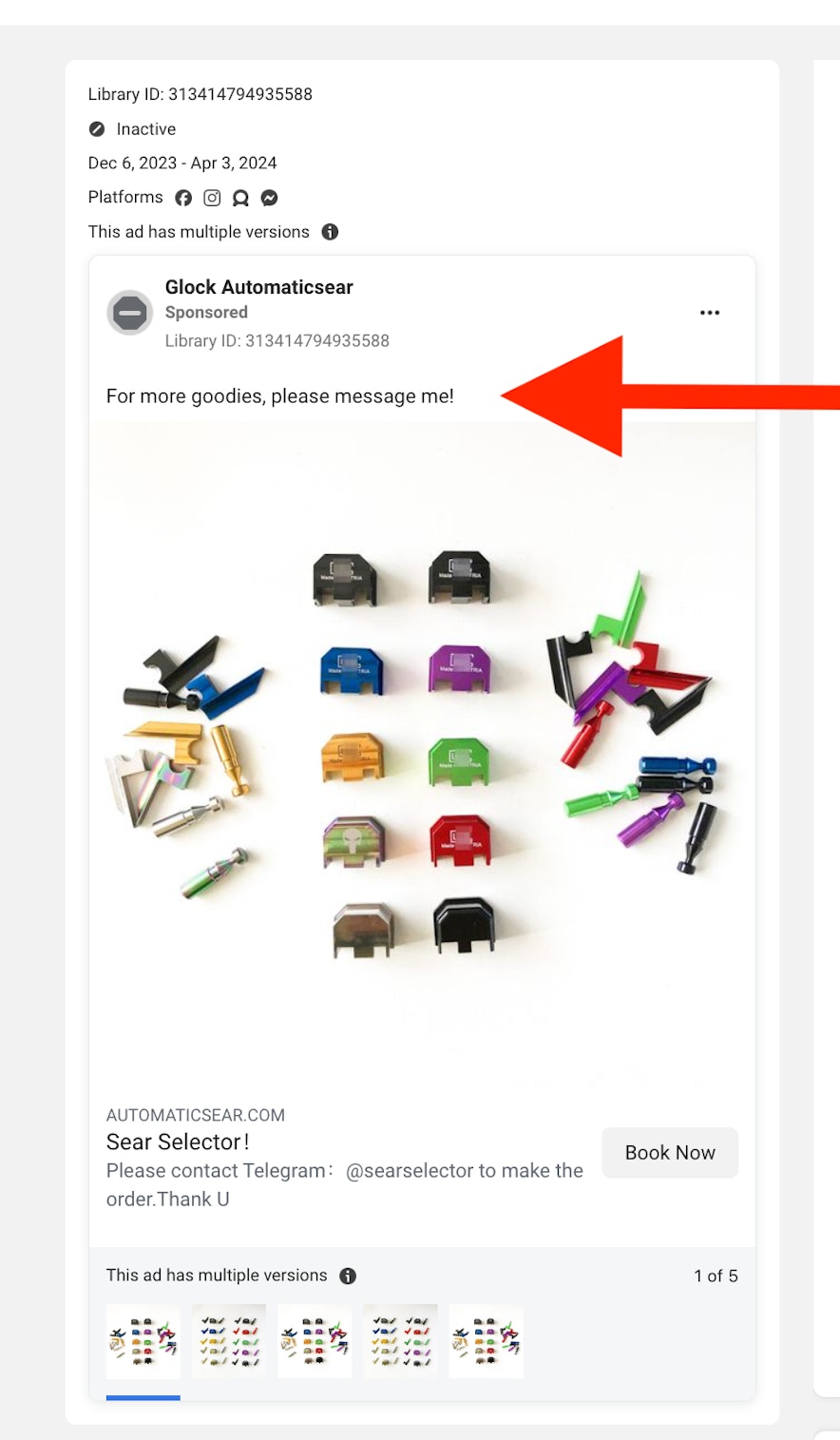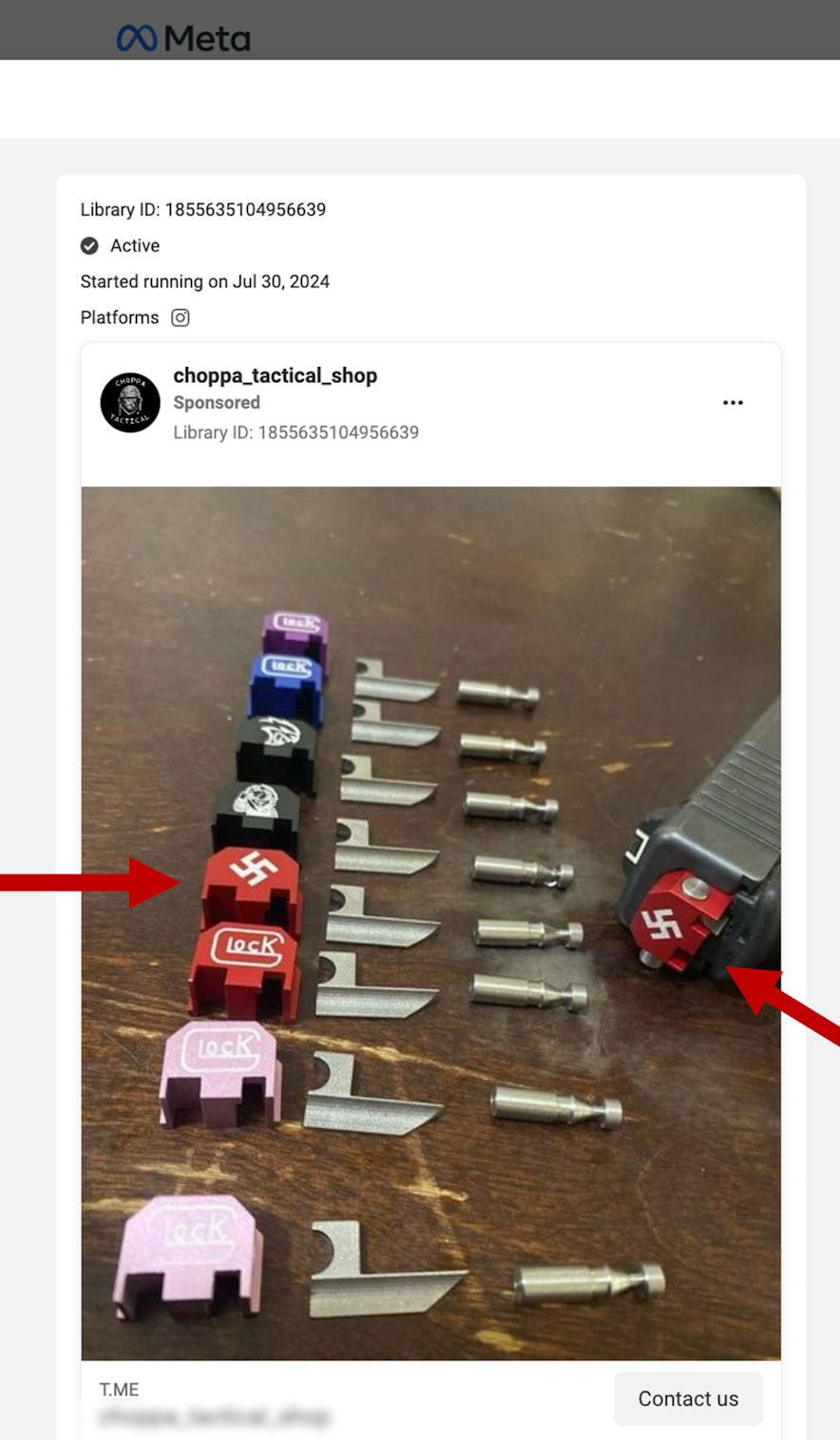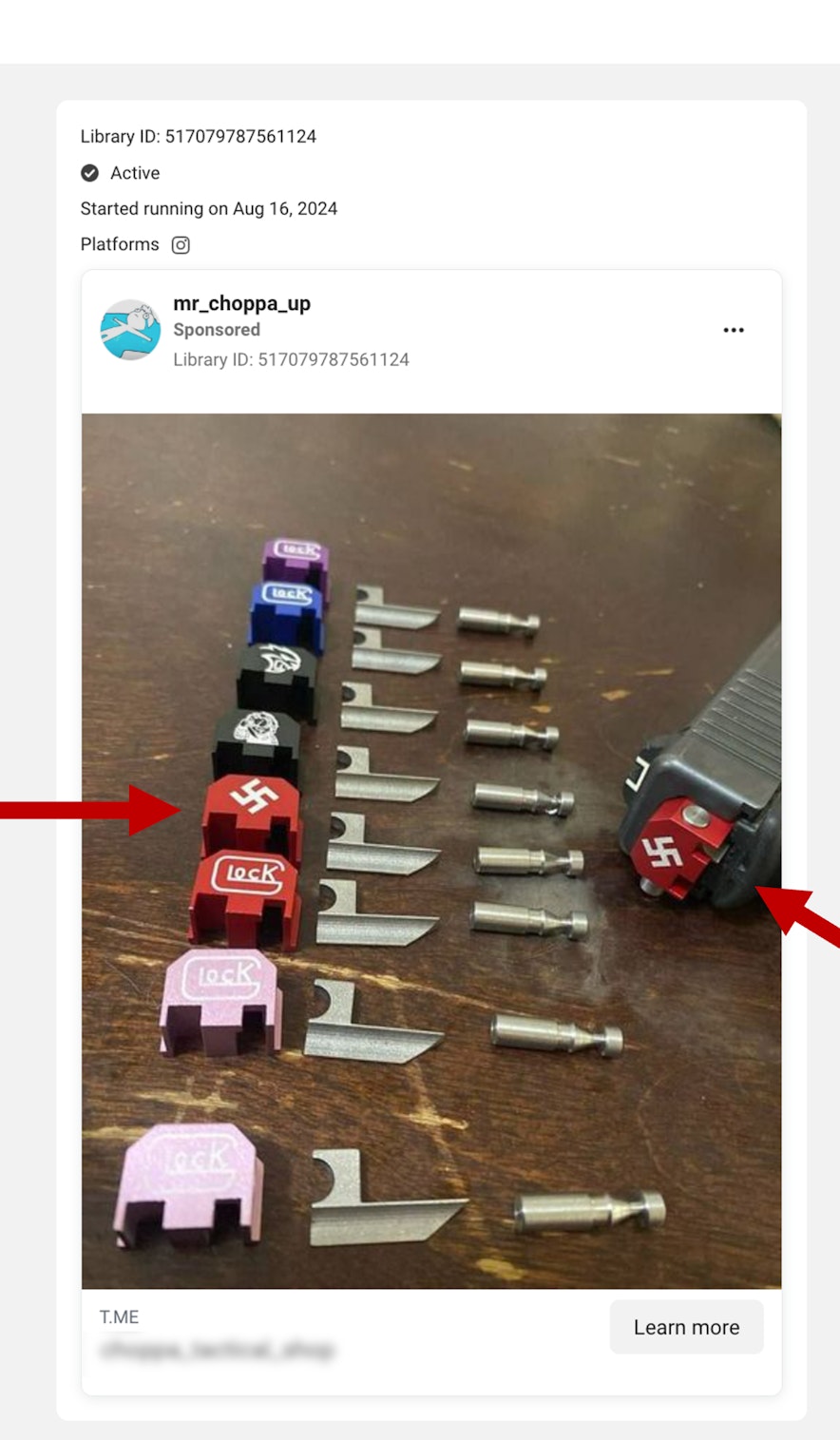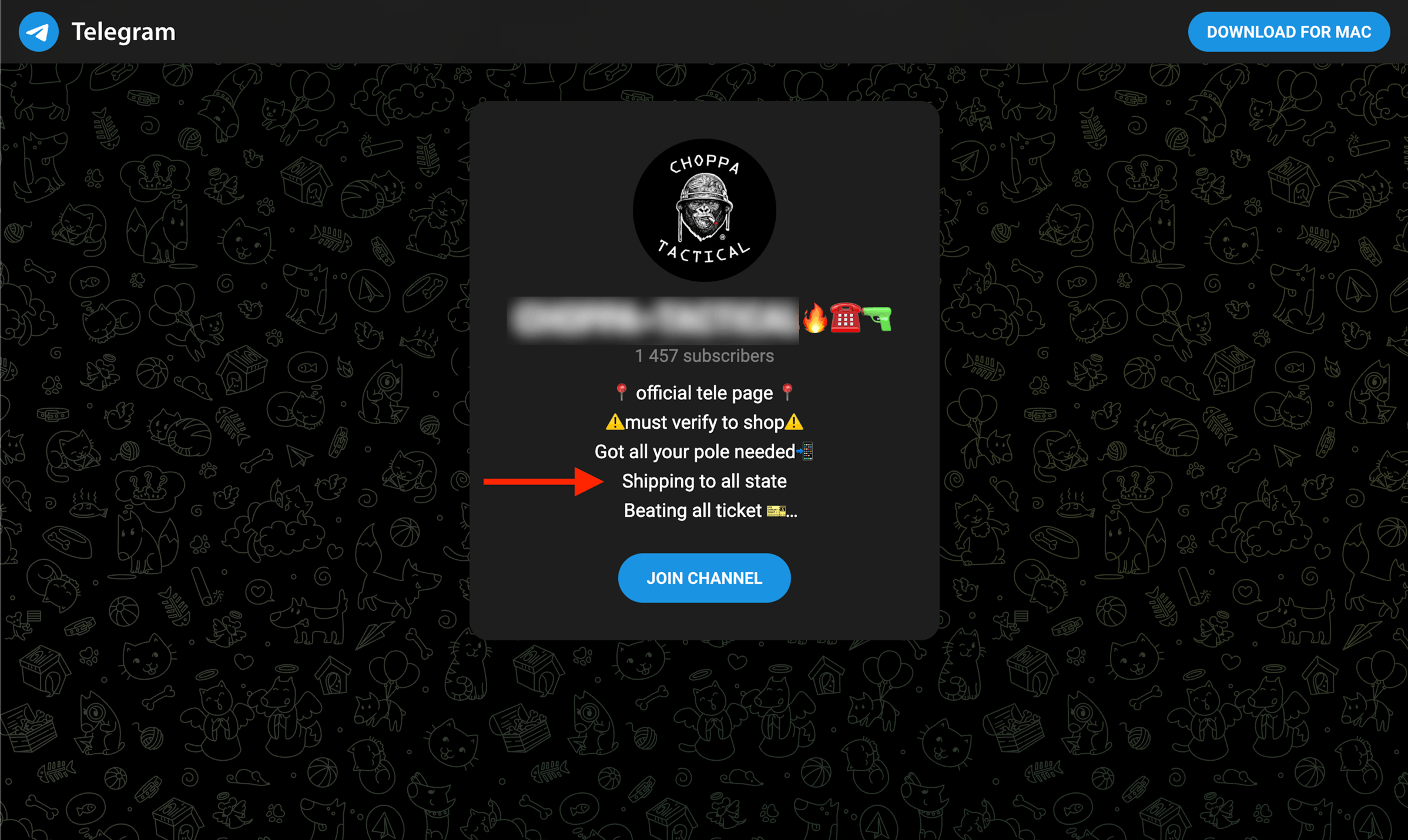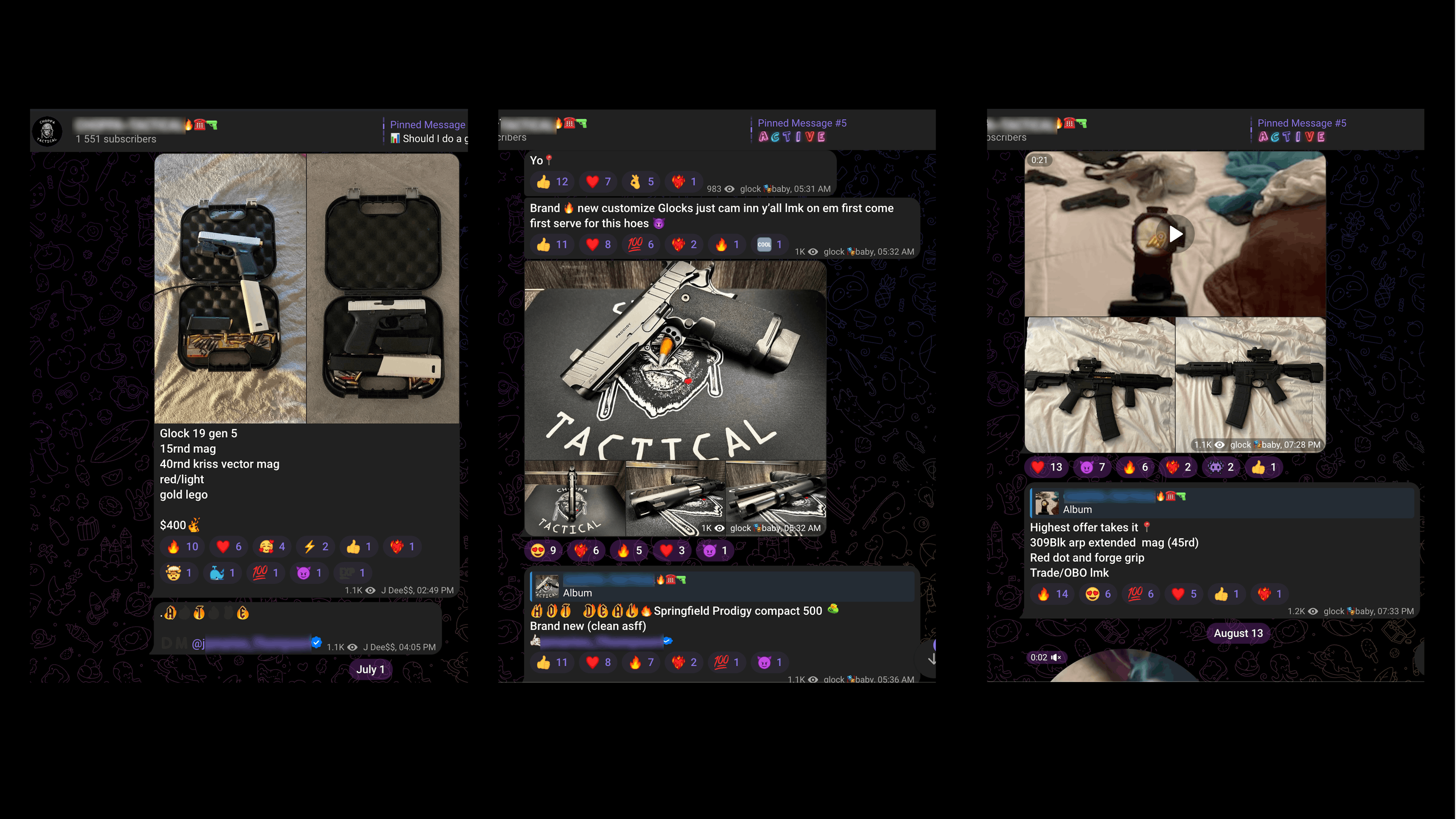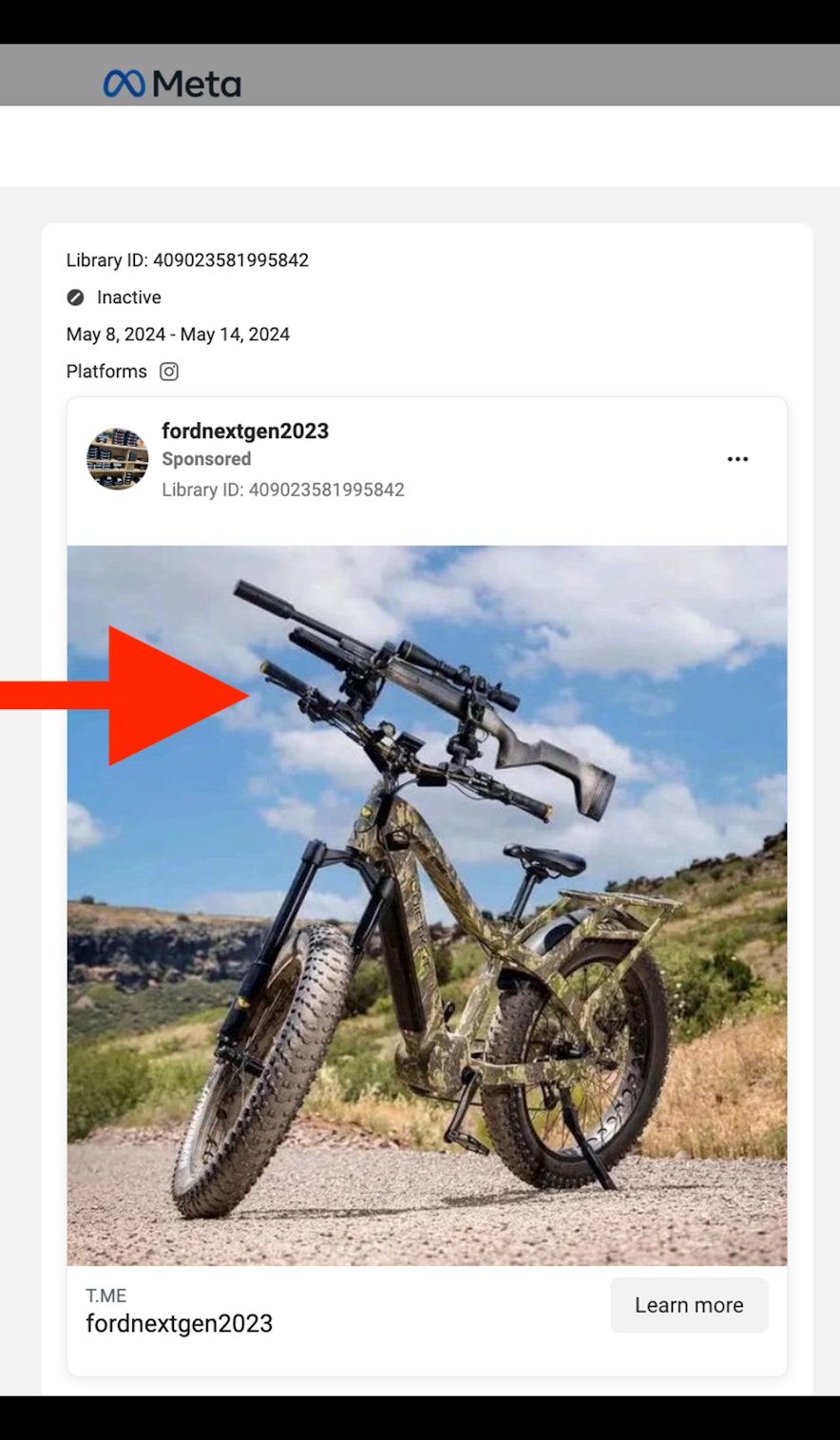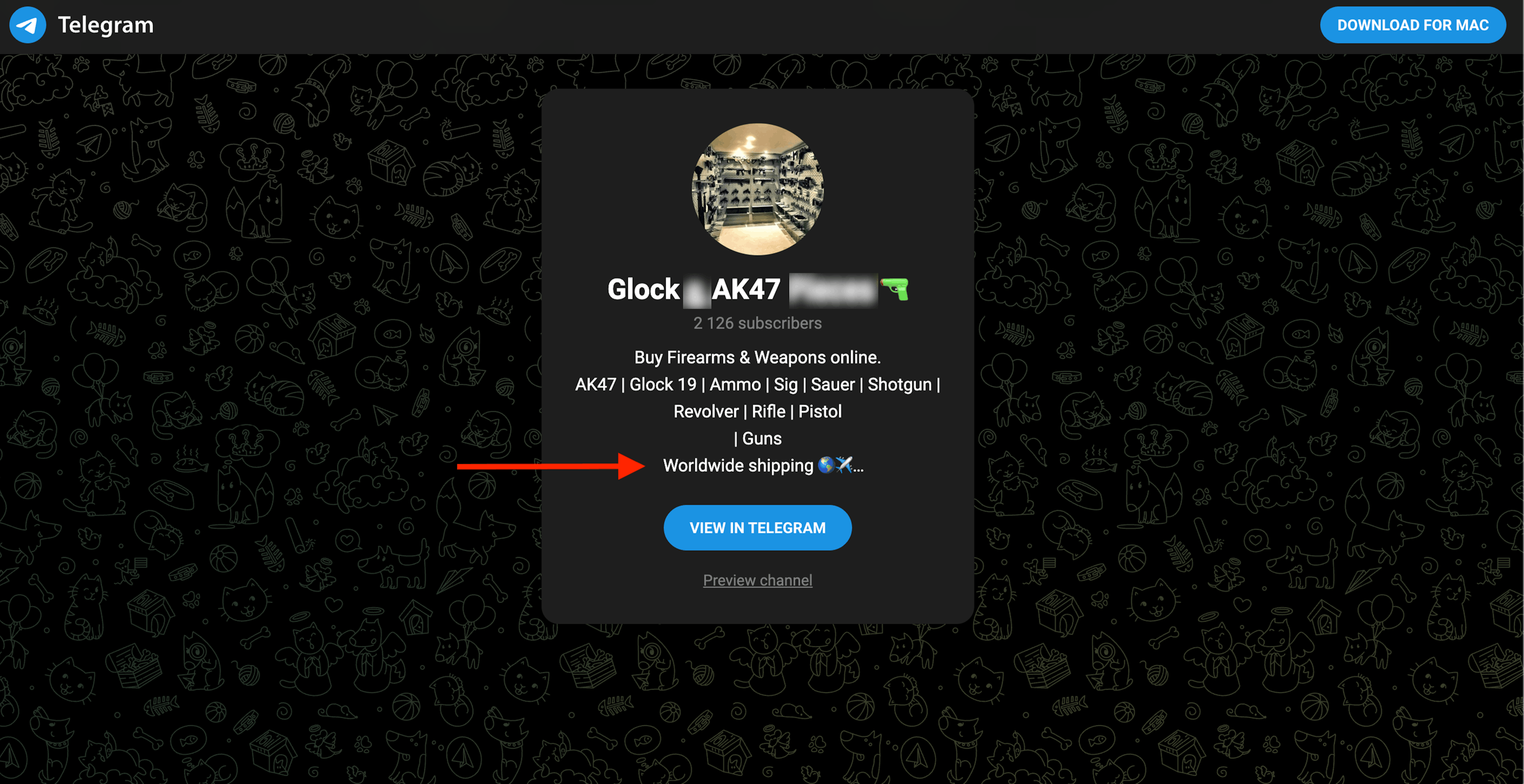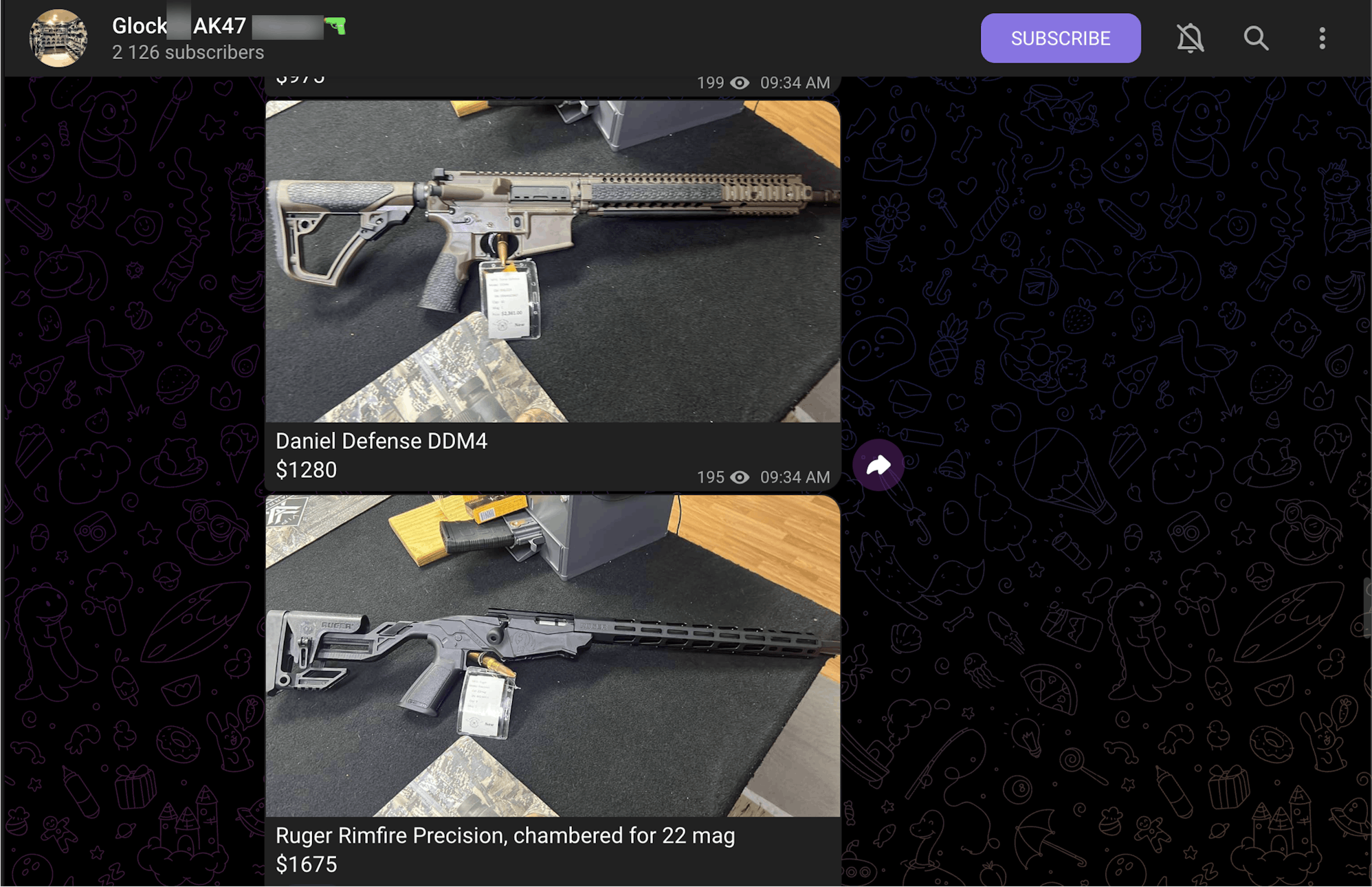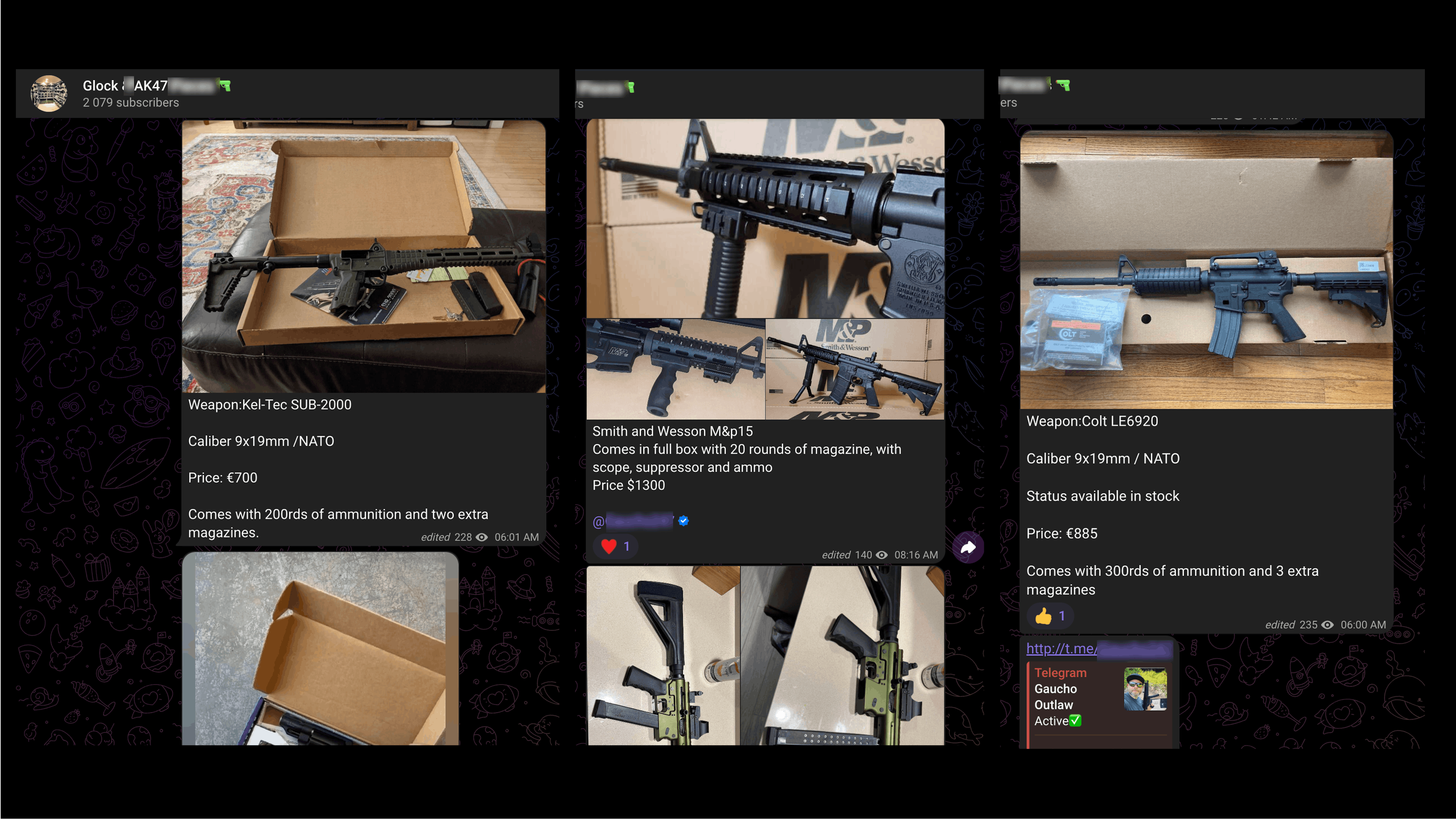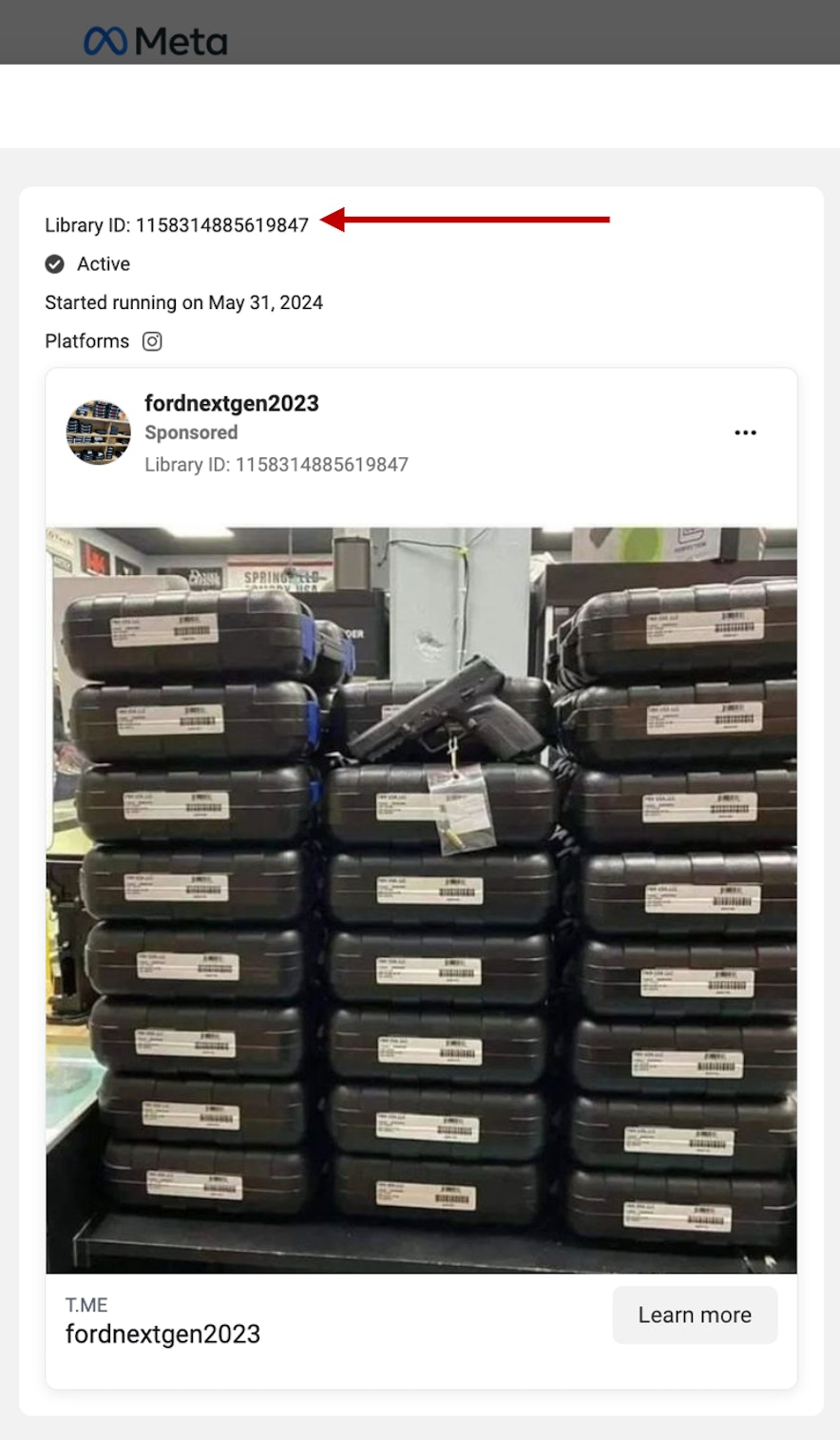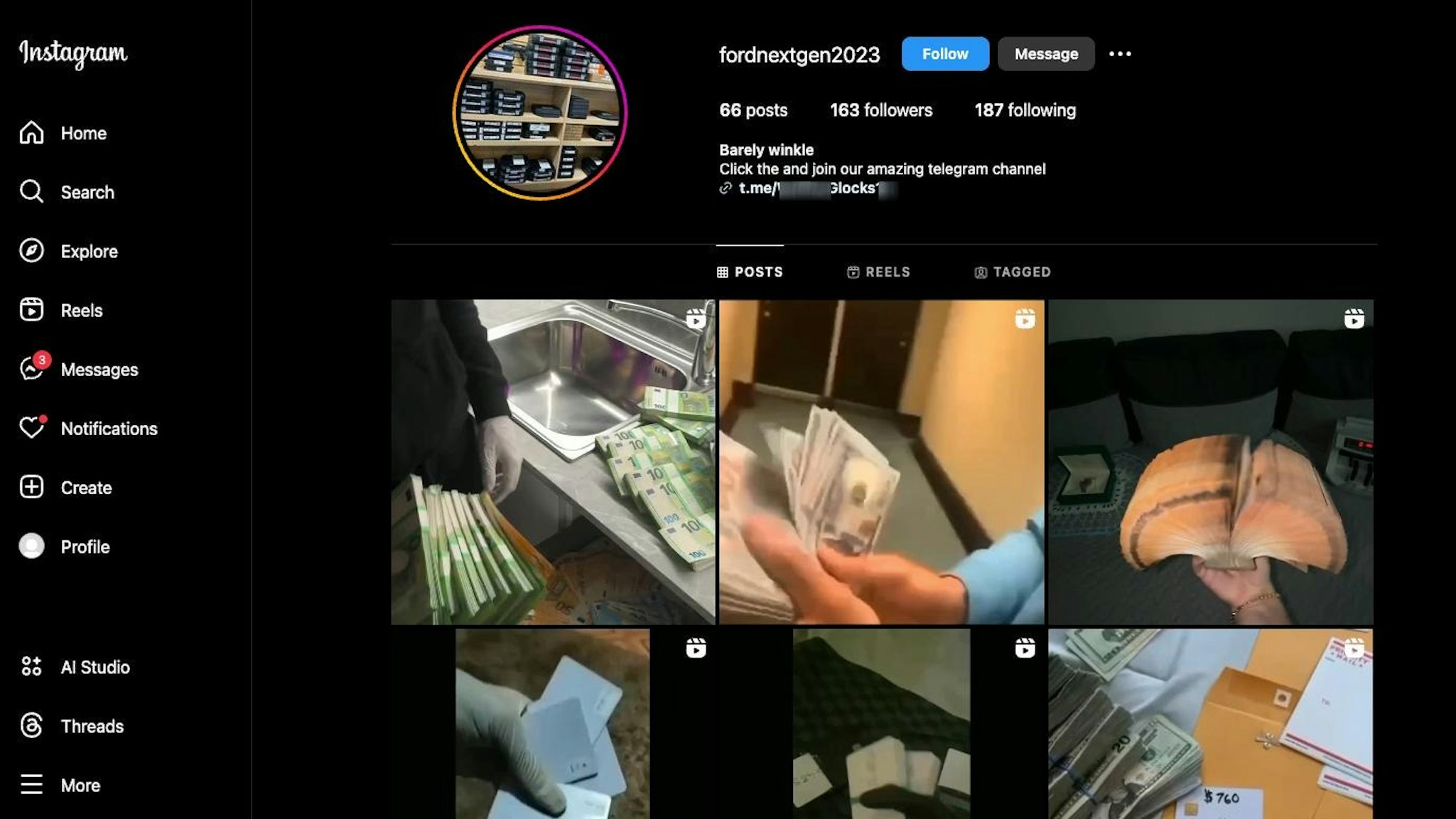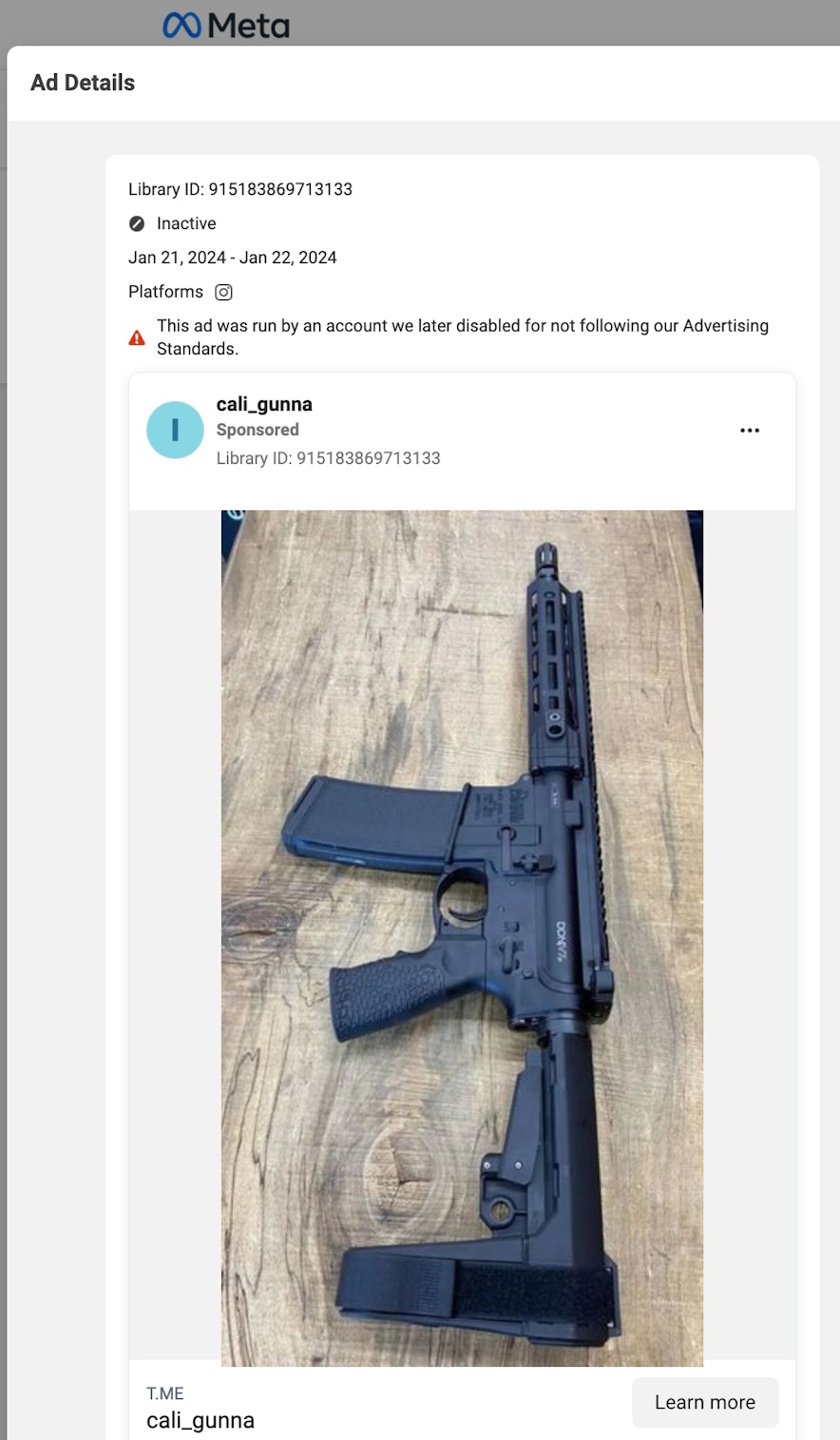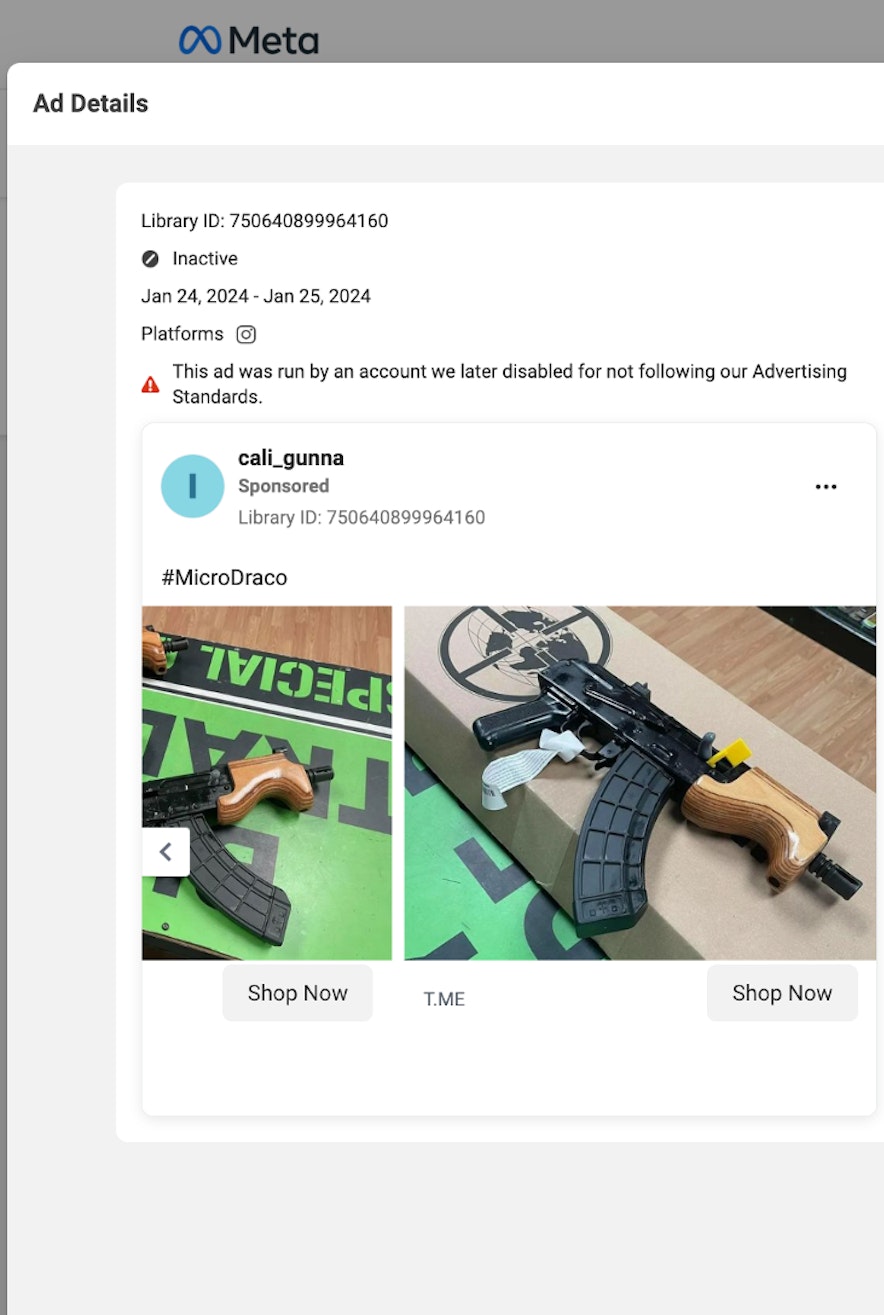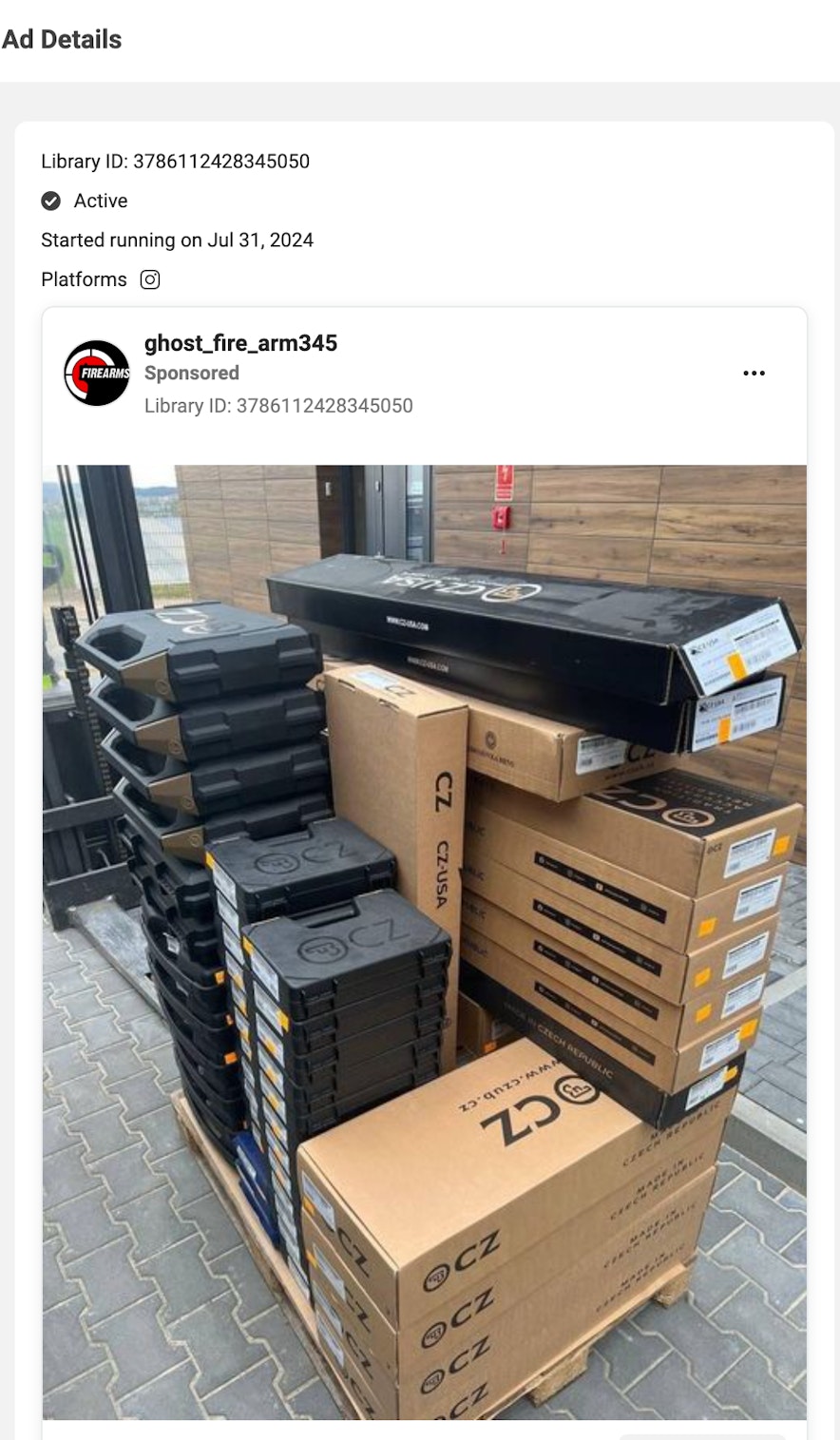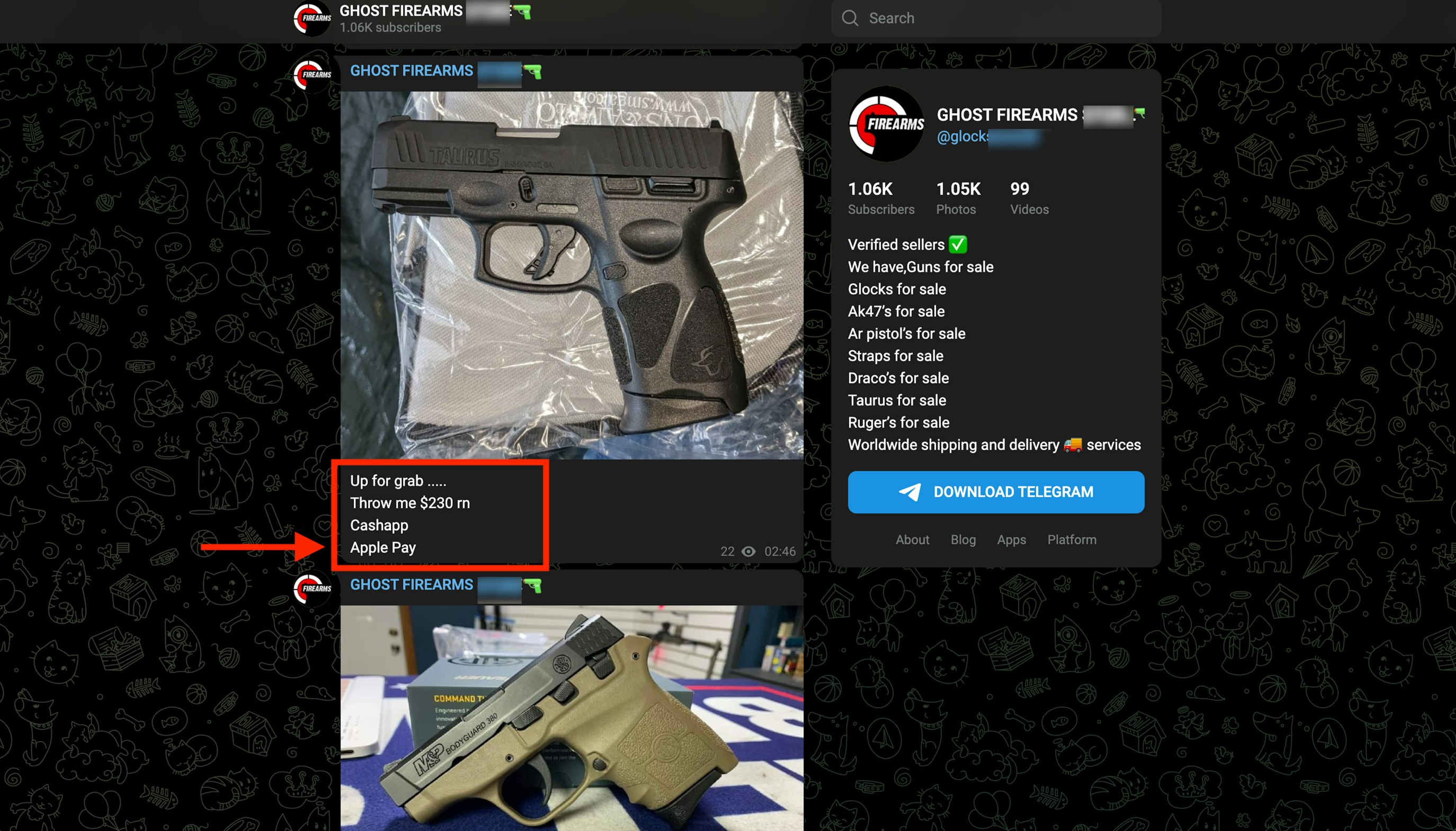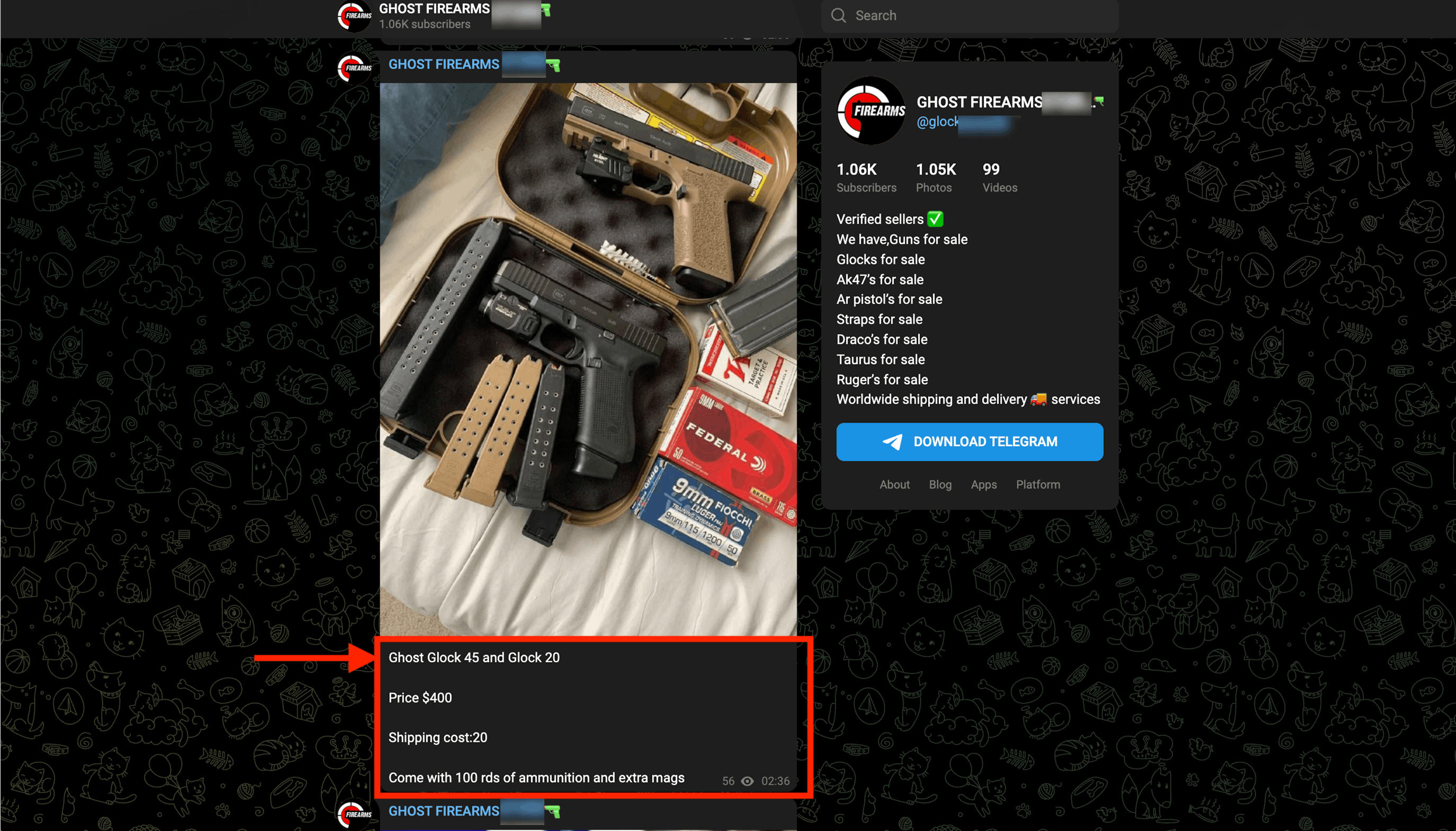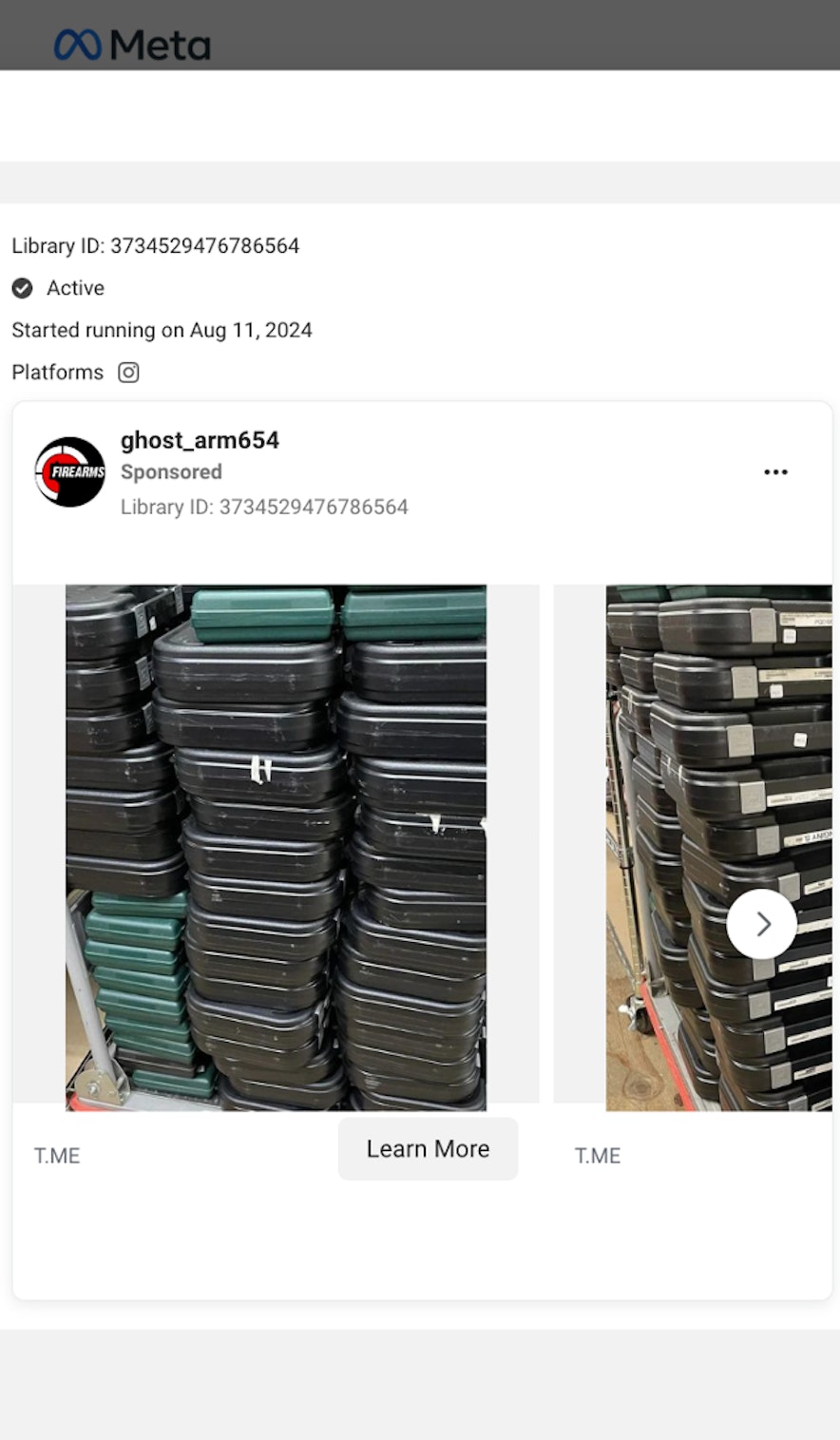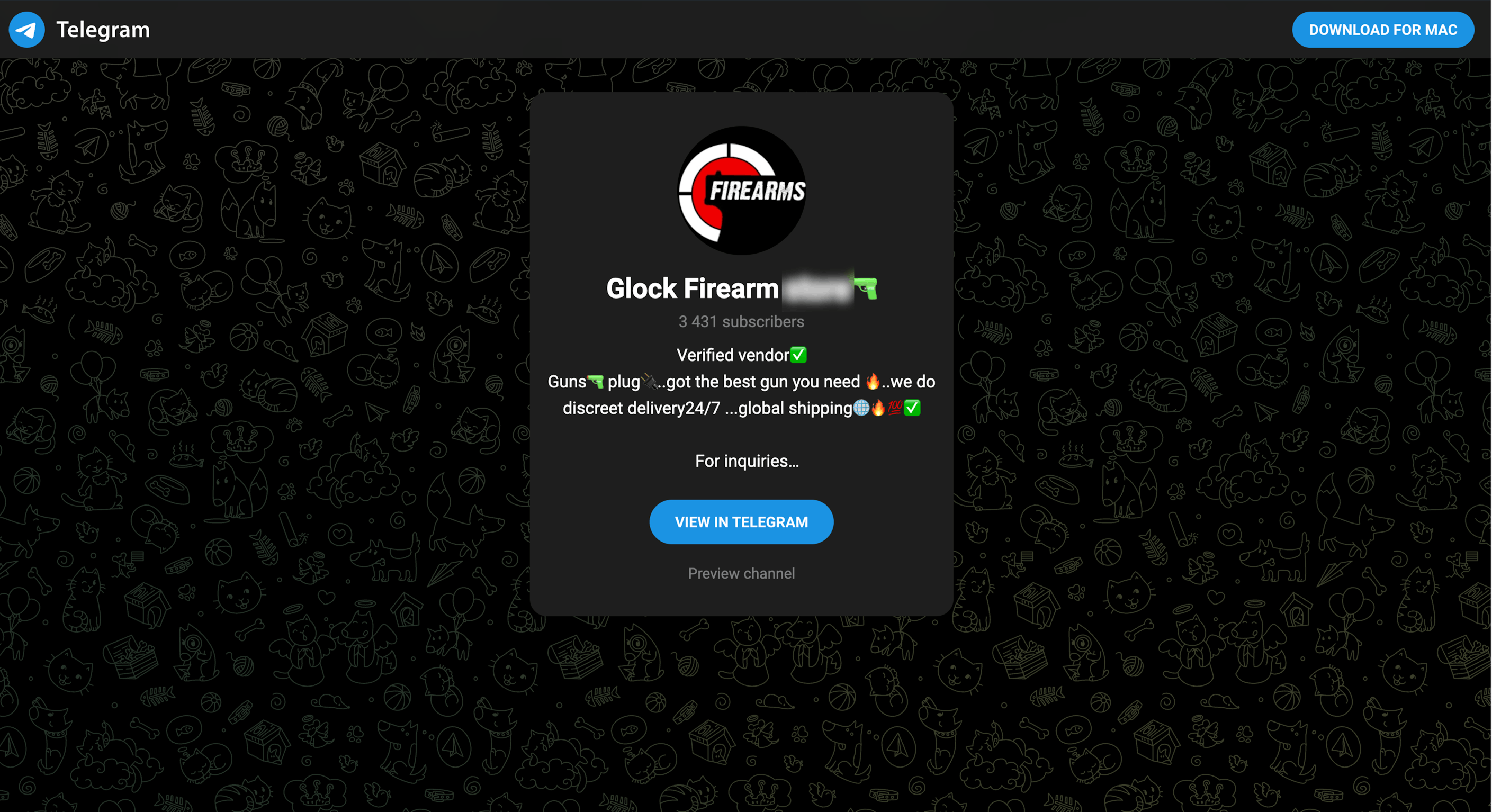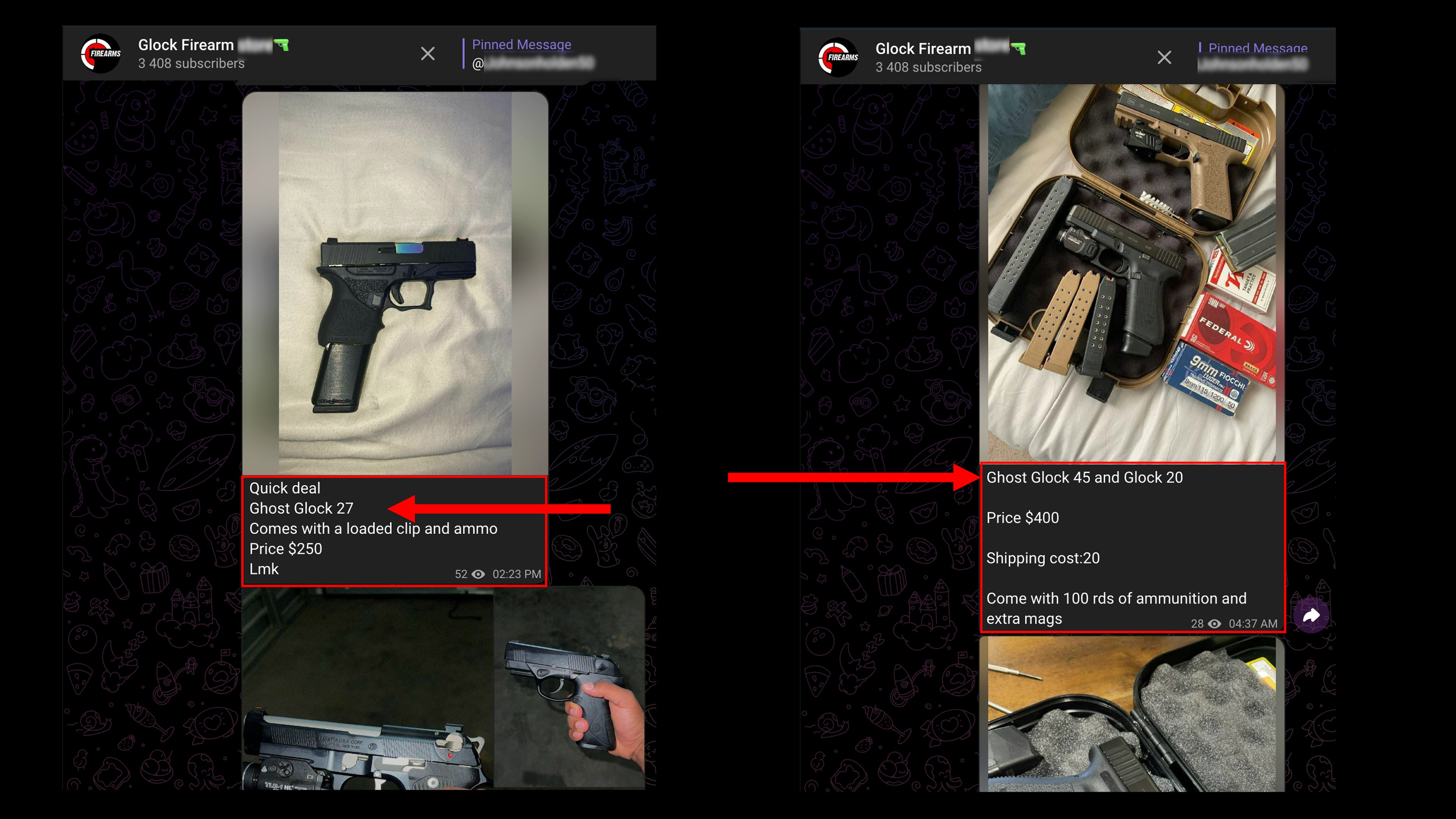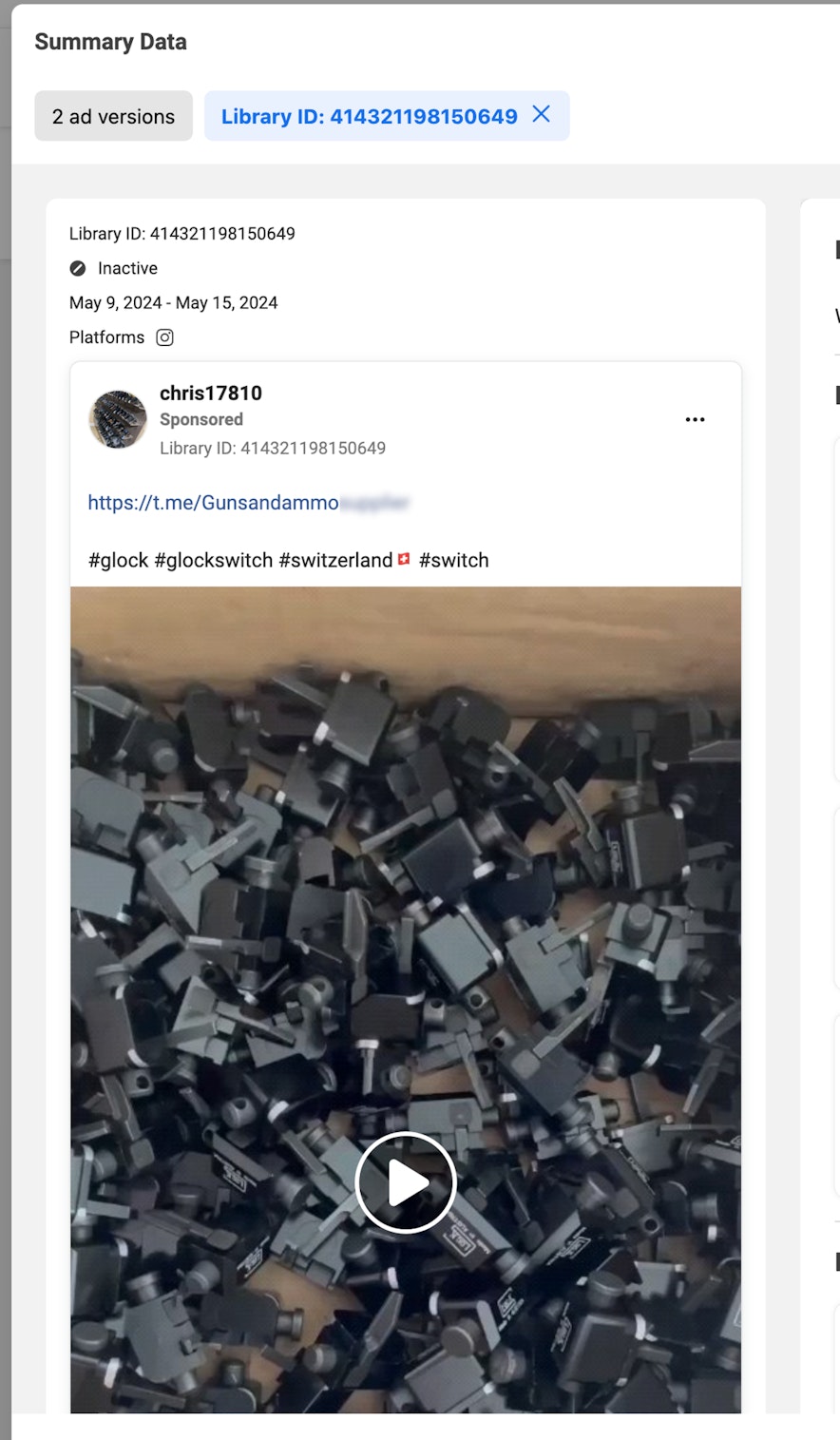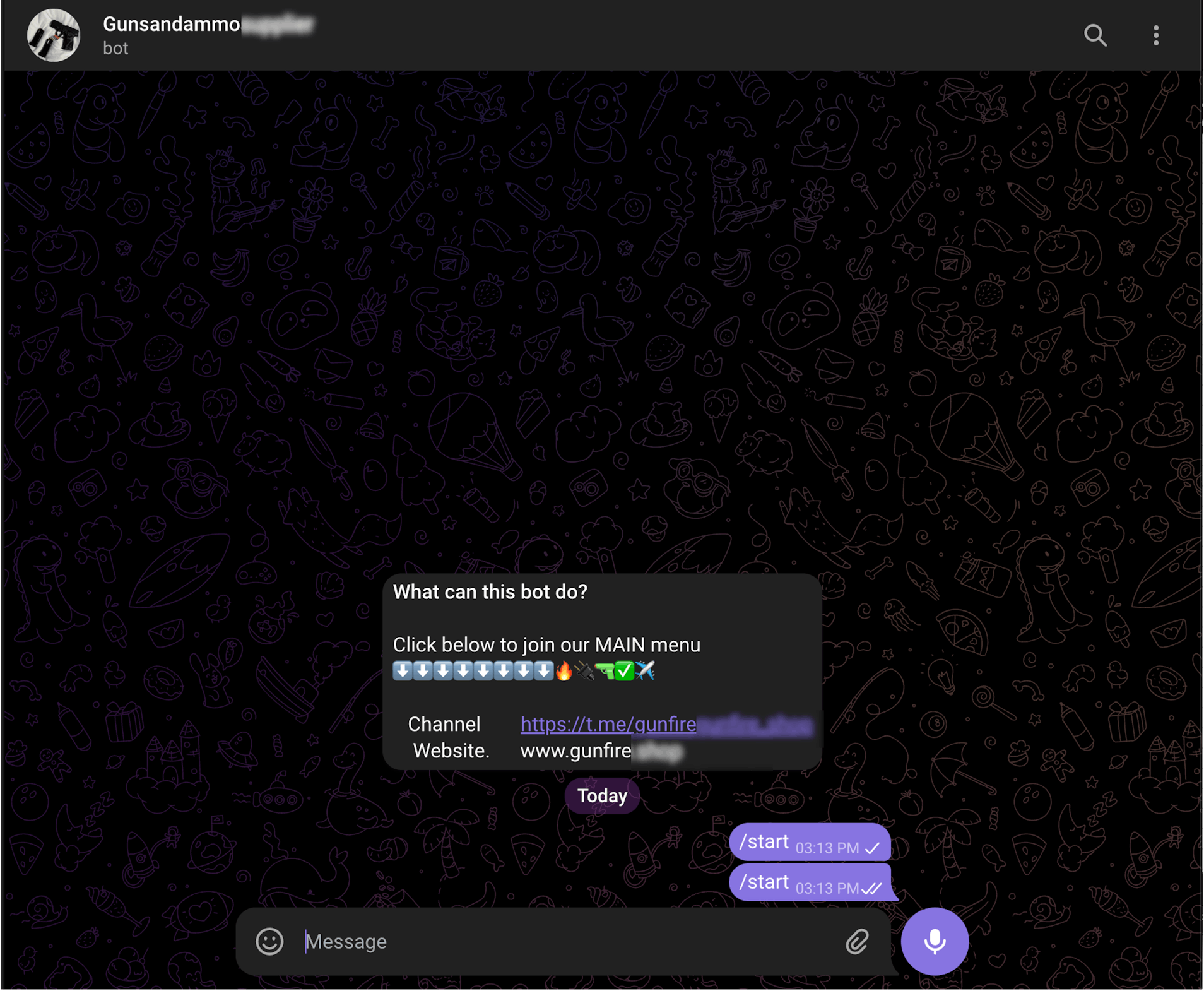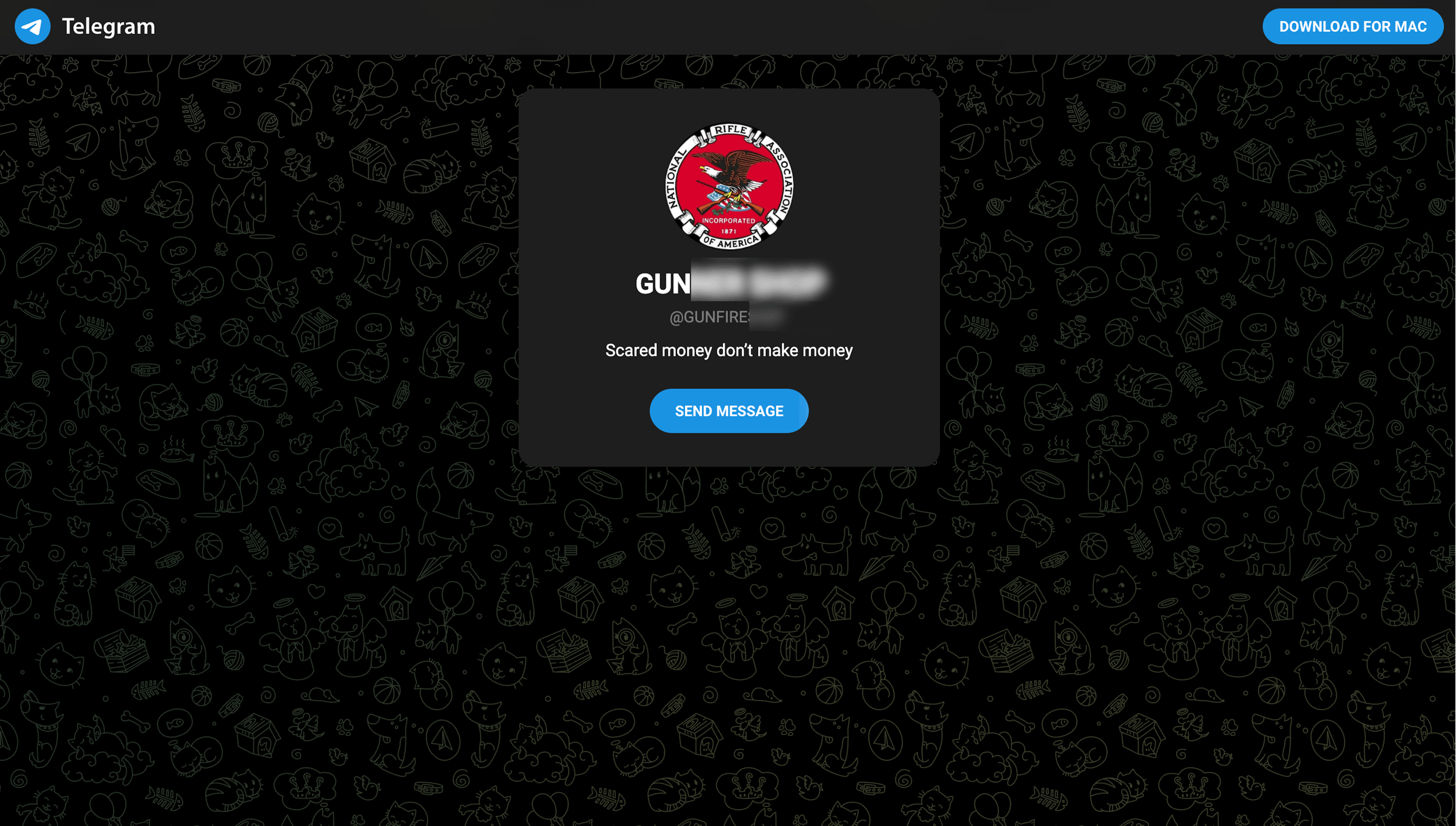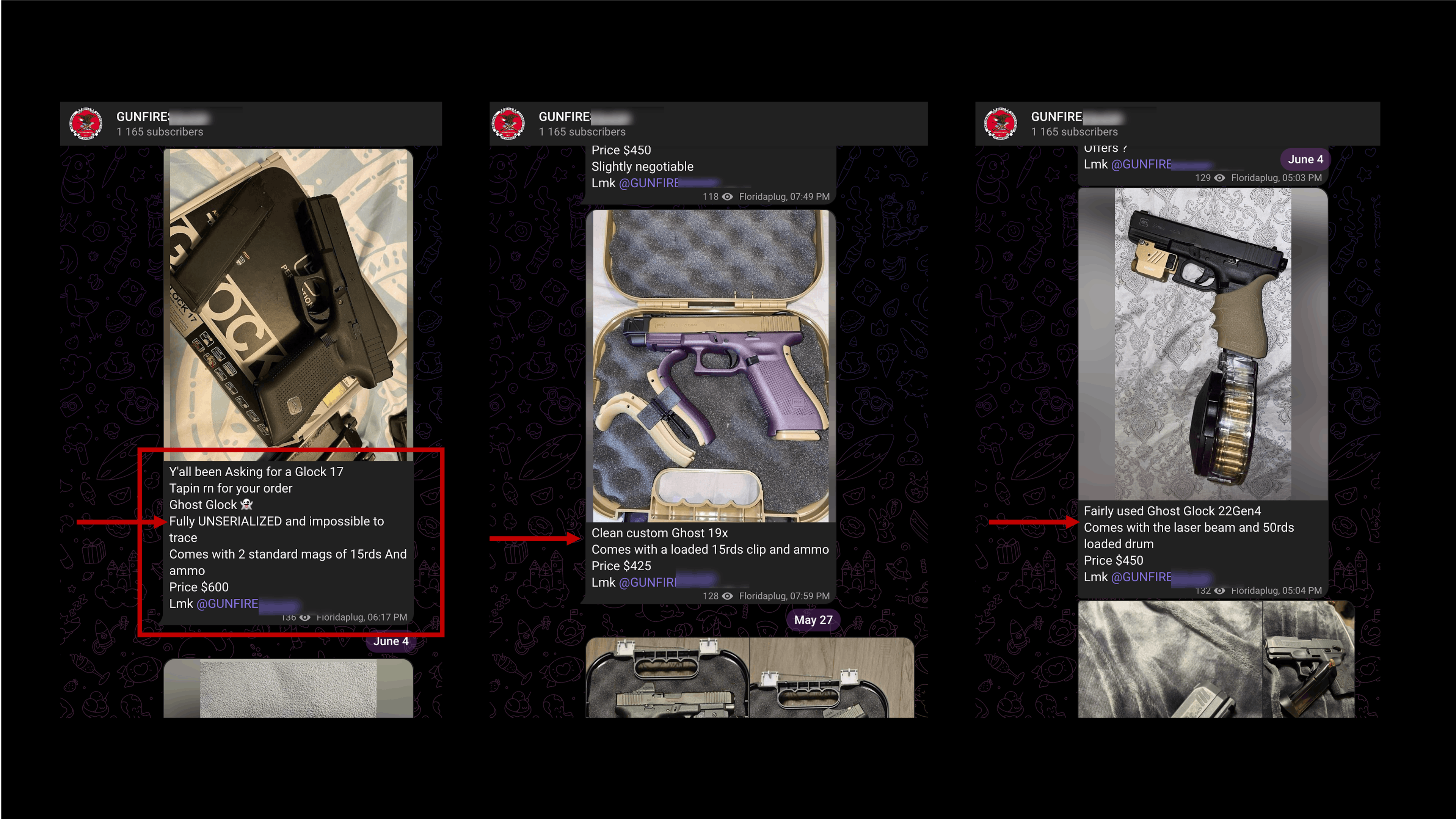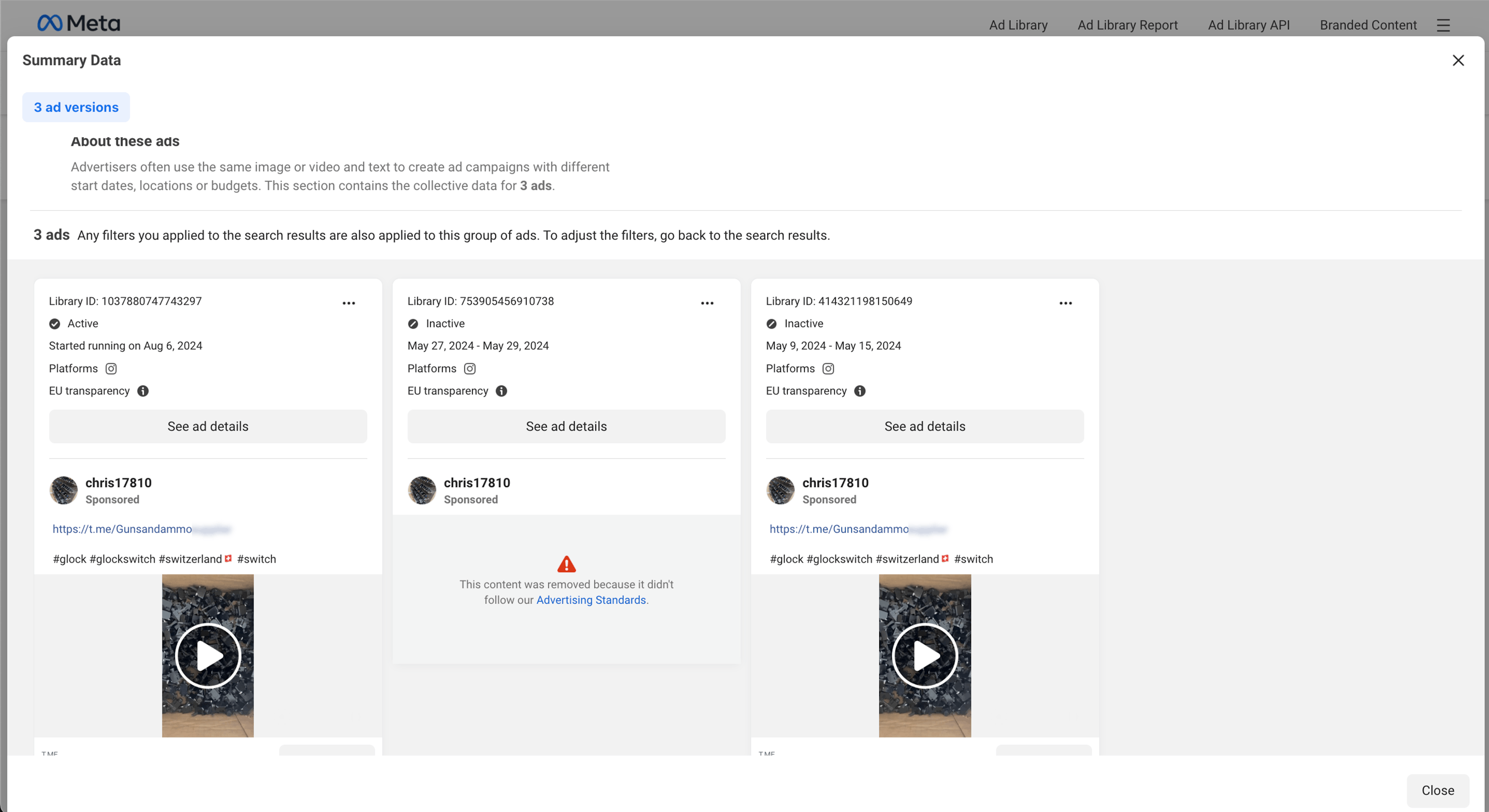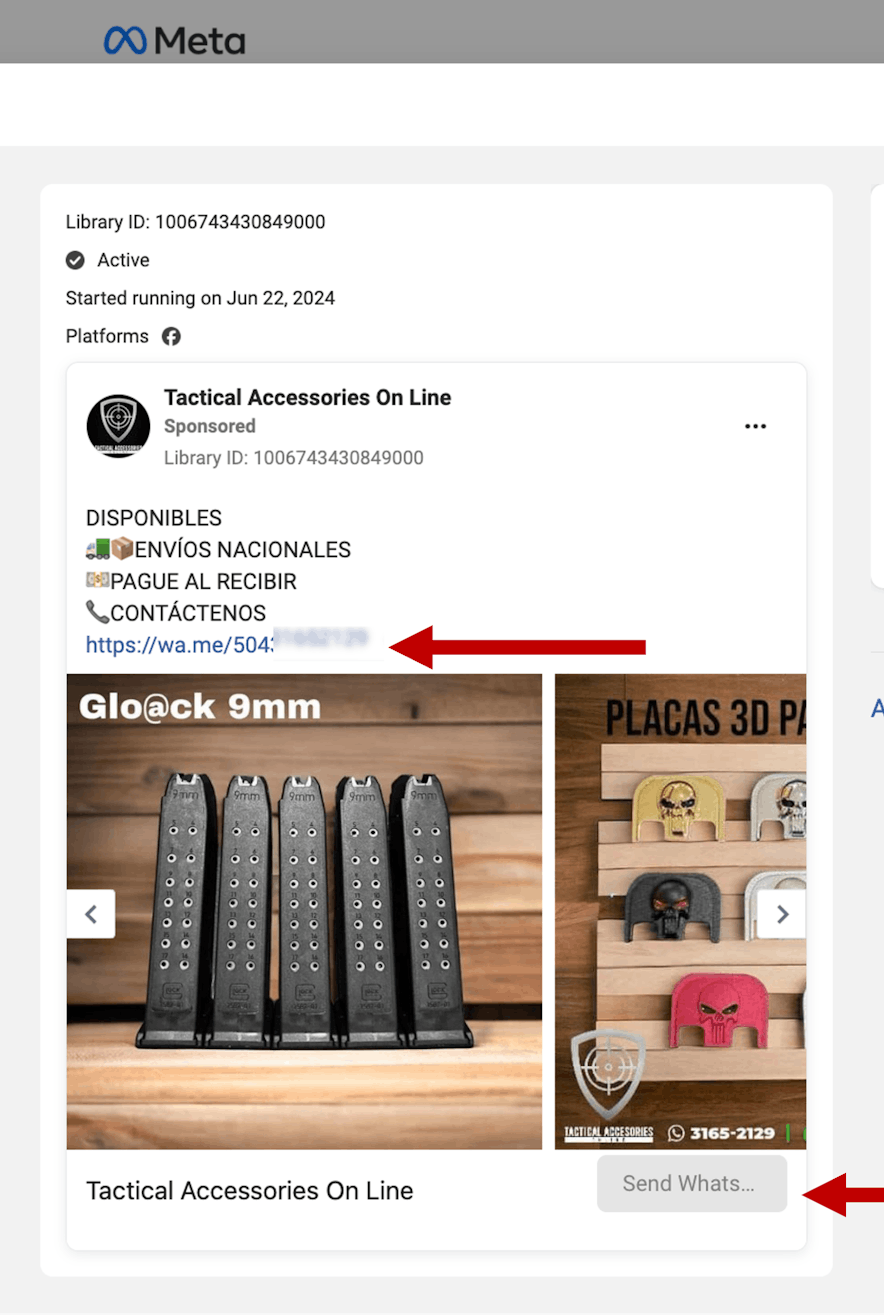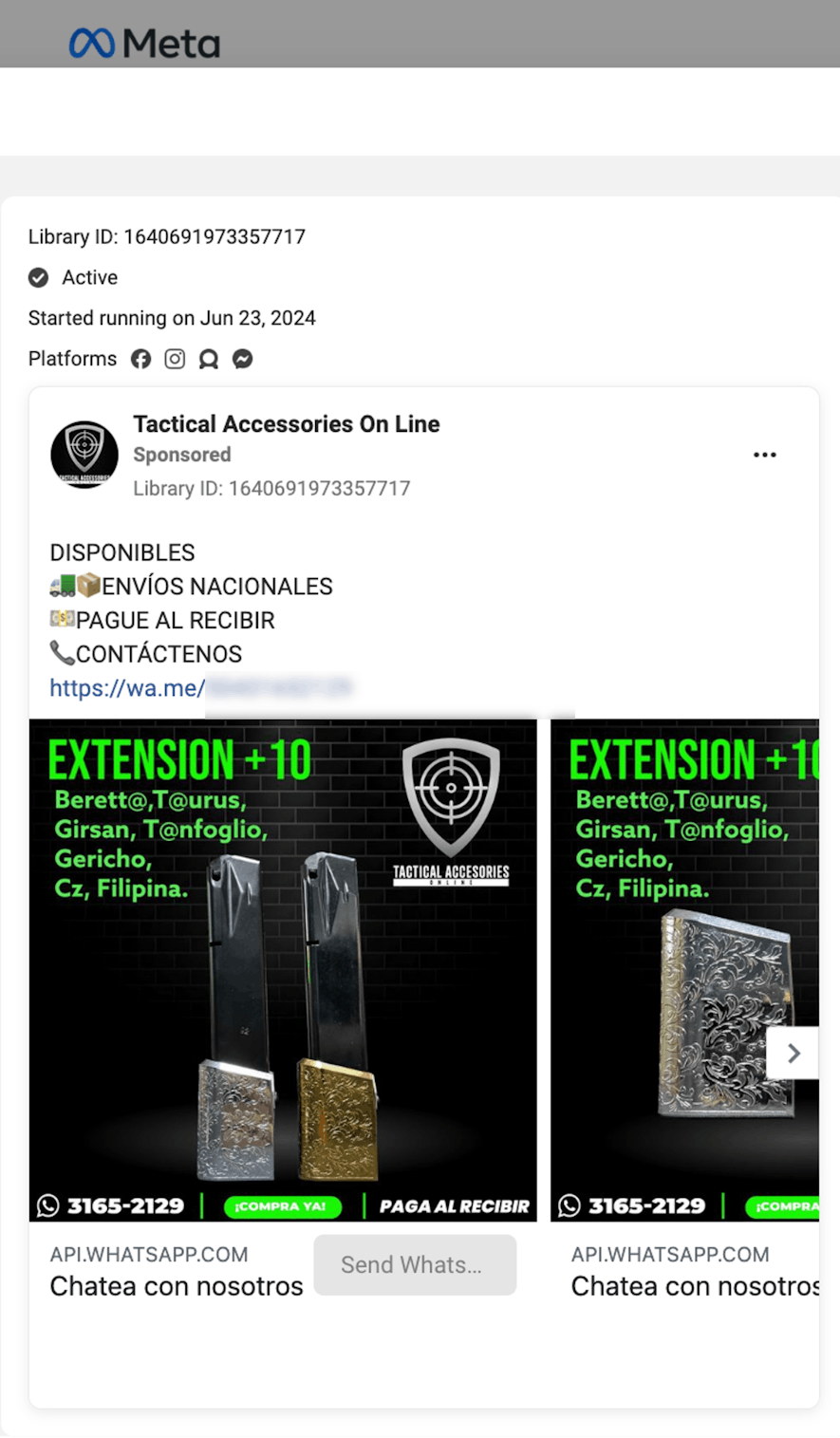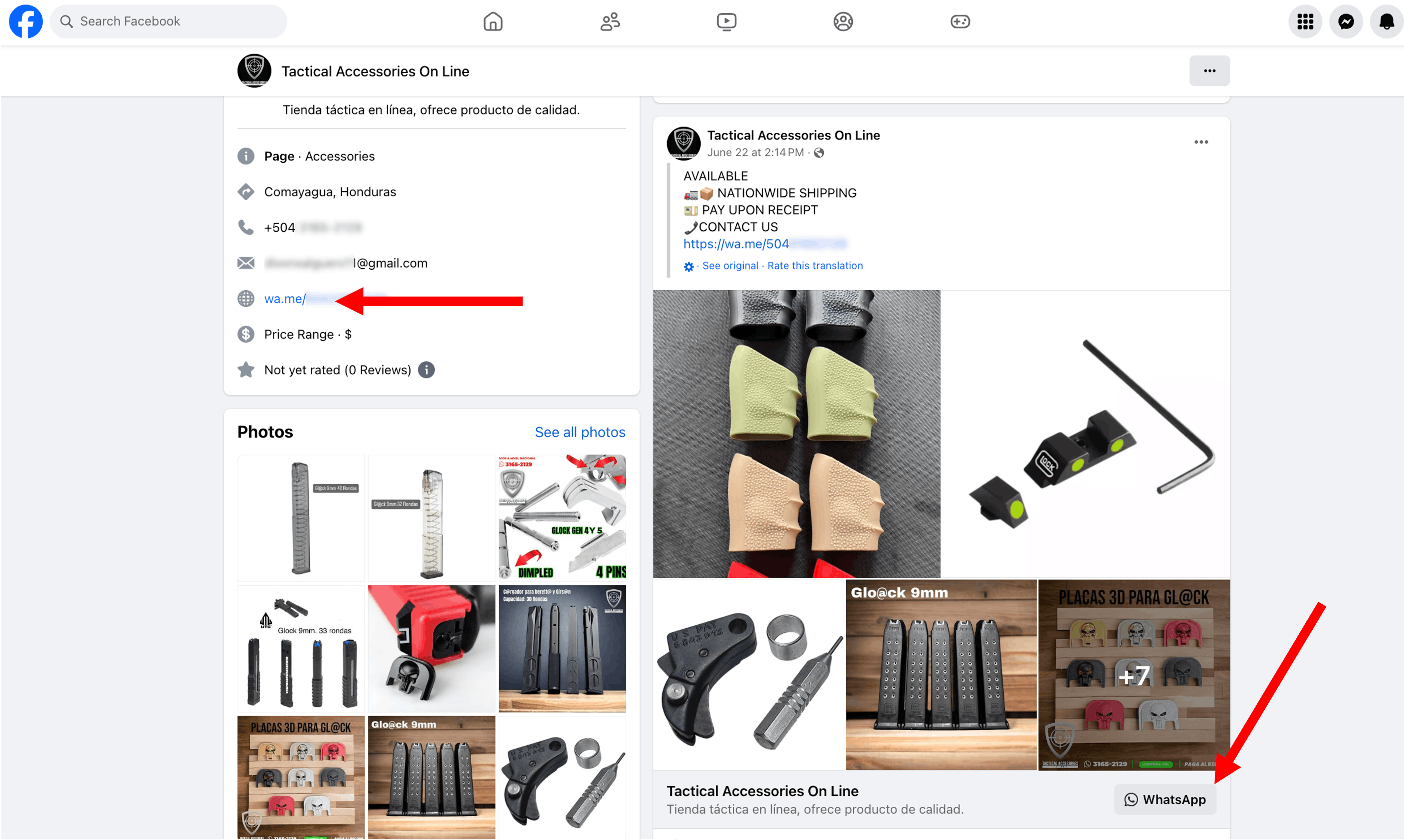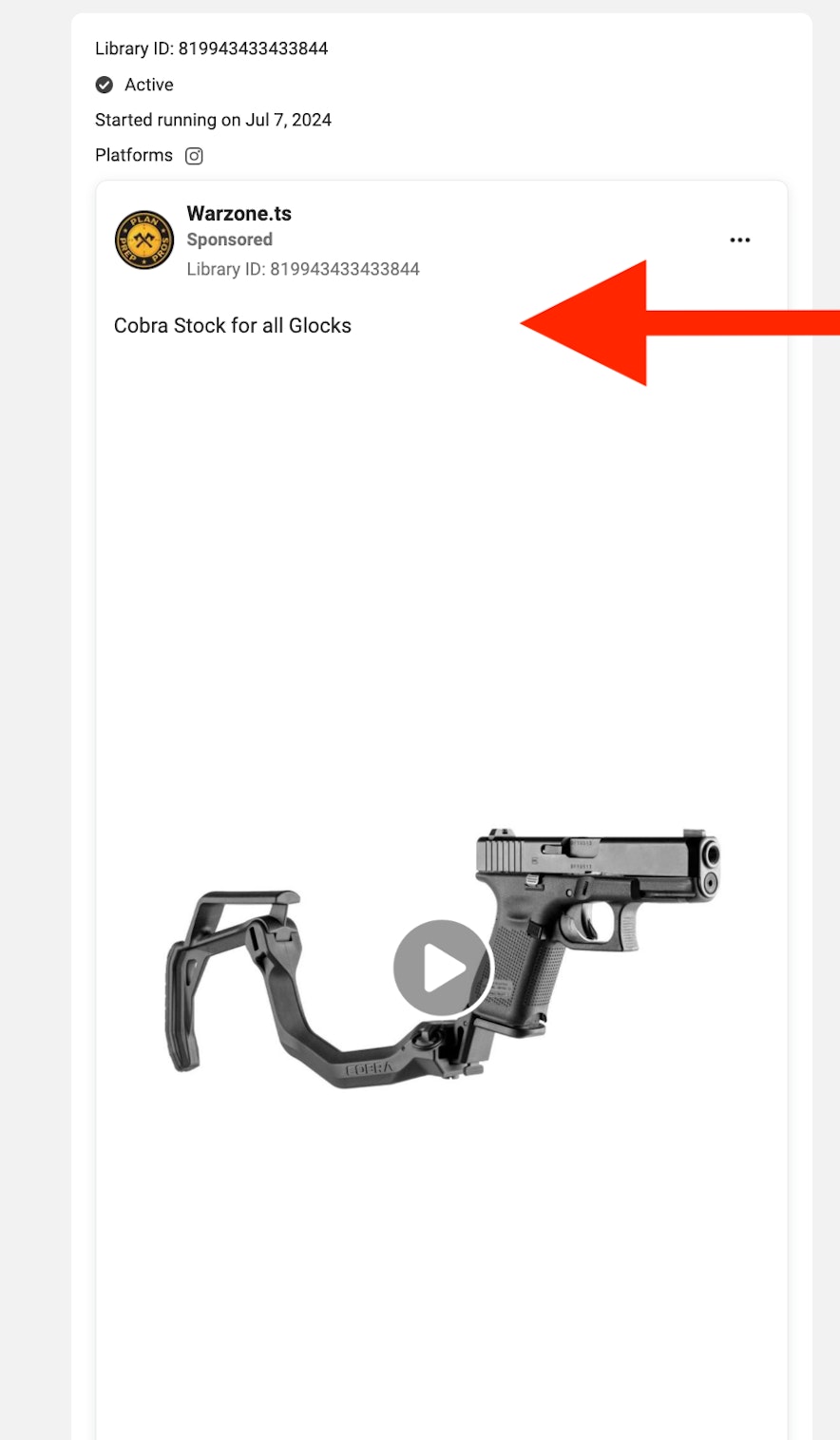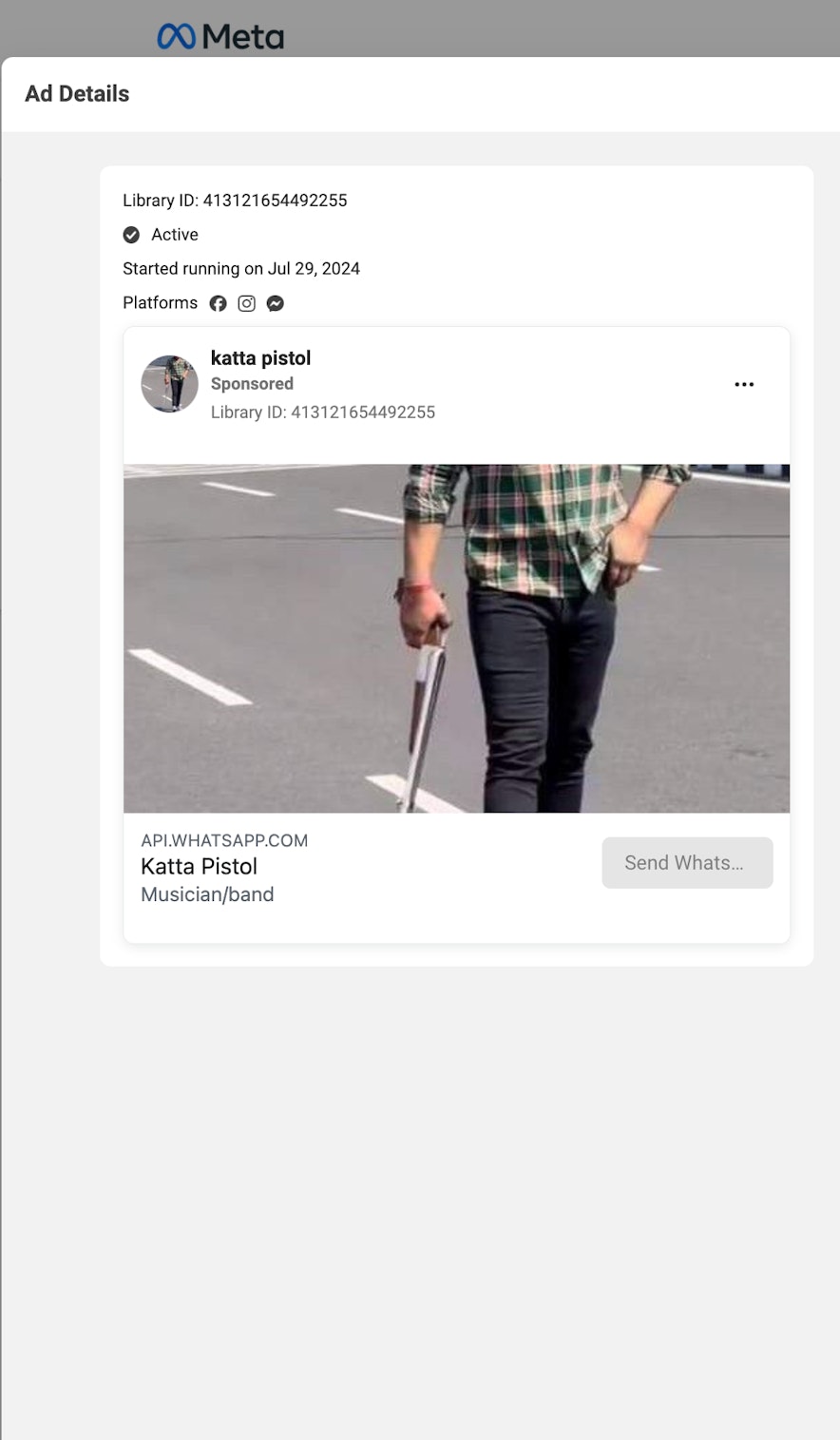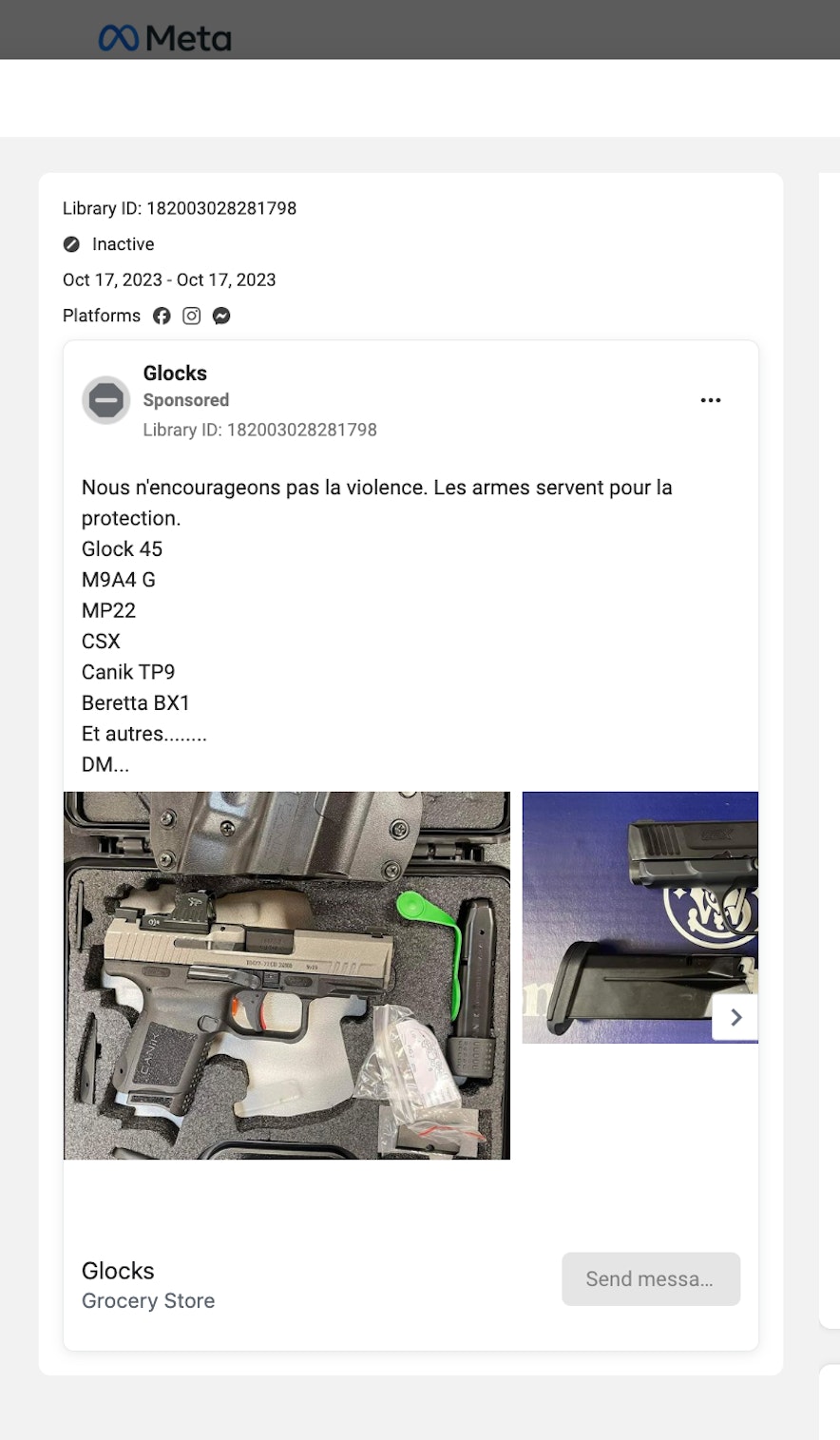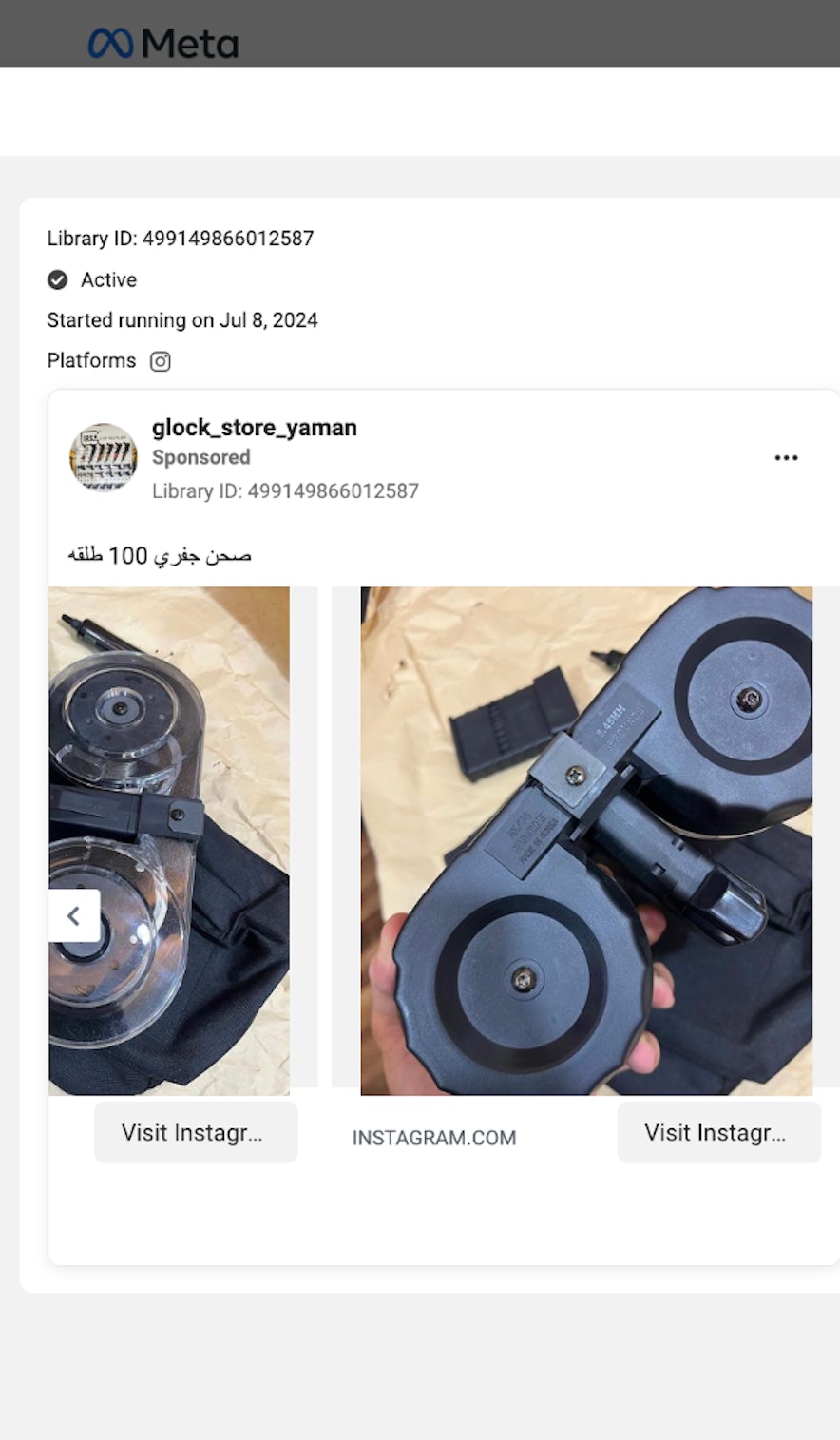Key points from this report:
- Meta approved more than 230 ads selling guns, gun accessories, or ammunition in violation of its policies, a new study found.
- The ads appeared on Facebook, Instagram, Messenger, and Meta’s Audience Network of mobile apps.
- The ads offered firearms including Glock pistols, assault weapons, or untraceable "ghost guns."
- Others sold illegal “switches,” which are used to convert semiautomatic weapons into machine guns.
- Meta missed obvious signs of gun sales despite saying it reviews ads before they run to ensure they meet company standards.
- Some of the ads selling firearms ran for weeks or months before they were removed by Meta, if they were detected at all.
- The ads often pointed prospective buyers to the messaging app Telegram or Meta’s own WhatsApp and Messenger to make gun purchases.
Meta approved hundreds of ads selling guns and gun accessories in violation of its own policies, according to a new investigation by the Tech Transparency Project (TTP), raising questions about the company’s ability, or willingness, to enforce safety standards for its lucrative advertising business.
The investigation identified more than 230 ads on Facebook, Instagram, and other Meta platforms offering firearms like Glock pistols, assault weapons, and untraceable “ghost guns.” Other ads offered devices designed to make firearms more lethal, such as illegal “switches” that can convert semiautomatic weapons into fully automatic machine guns.
Many of the ads were obvious about their intentions, naming or showing specific weapons and pointing viewers to messaging apps like Telegram or Meta’s own WhatsApp to connect with the seller to make a purchase. The ads clearly violated Meta’s advertising standards, which say ads cannot “promote the sale or use of weapons” or “weapon modification accessories.”
The findings add to growing questions about the effectiveness of Meta’s largely automated ad review process and Meta’s commitment to enforcing the rules governing its advertising engine, which generates the bulk of the company’s revenue. A July study by TTP found similar problems with illicit drug ads on Facebook and Instagram.
While TTP found deficiencies in Meta’s handling of gun advertising, the investigation also found that the company, by one measure, managed to keep gun content out of its algorithmic content recommendations.
When researchers tested whether Instagram recommended gun content to test accounts for young video gamers, as YouTube did in a previous TTP study, they found that Instagram did not suggest any gun-related accounts to follow.
That suggests Meta is capable of putting some guardrails around firearms content—a step that it has not yet extended to its advertising business.
This investigation is a joint project of TTP and the Everytown for Gun Safety Support Fund (“Everytown”), with TTP taking the lead on the platform research and Everytown providing technical expertise. In light of the research findings, Everytown issued a set of recommendations to Meta for making its platform safer from illicit gun sales. Read the recommendations here.
Meta declined to comment on the findings.
Background and methodology
Facebook banned private sales of guns on Facebook and Instagram in 2016 following research by Everytown that connected unlicensed gun sales on Facebook to real-world gun violence. However, subsequent research found that guns, weapons parts, and ammunition remained widely available on the platforms years after the policy change. Federal criminal cases in recent years have highlighted the role Instagram continues to play in gun sales.
TTP sought to examine whether Meta’s advertising engine—which generates the bulk of the company’s revenue—is also facilitating the sale of firearms in violation of the company’s own policies. This builds on research TTP conducted in 2022 about Meta ads that skirt platform rules around weapons content.
For this investigation, TTP searched the Meta Ad Library between June 1 and August 20, 2024, for a series of gun-related terms: pistol(s), Sig Sauer, Glock(s), Glock 17, Glock 19, Glock 43, Draco, rifle(s), Ruger, ammunition, ammo, automatic switch, automatic sear, and rounds. Auto sears, or switches, which are illegal under U.S. law, are devices that convert a semiautomatic gun into a fully automatic weapon, allowing it to fire like a machine gun.
Researchers also searched for “t.me,” the short link for the messaging app Telegram. Sellers of illegal goods on social media often point buyers to Telegram, which is known for its hands-off approach to content moderation, to complete transactions out of public view.
Through these searches, researchers identified 237 ads that offered guns, gun accessories, or ammunition and ran on one or more Meta platforms (Facebook, Instagram, Messenger, and Meta’s Audience Network of mobile apps). The ads clearly violated Meta’s prohibition against ads that “promote the sale or use of weapons” or “products that might be attached or used with a weapon to enhance or customize its form or function.”
Many of these ads ran in the European Union and featured items that may be illegal to buy or possess under EU law. The EU’s Firearms Directive, which sets minimum common rules on gun acquisition and possession for civilians in EU member countries, prohibits automatic firearms and semiautomatic firearms equipped with high-capacity loading devices. It also states that guns should have clear marking and be registered before entering the market. The EU’s Digital Services Act requires “very large online platforms” (including Facebook and Instagram) to take measures to police their services for illegal content, like firearm sales that violate EU law.
Of all the Meta platforms, Instagram hosted the most gun ads identified in this report: 215 out of the total 237. More than half of those (118) ran on Instagram alone. That is a noteworthy result, given that Instagram remains one of the most popular social networks for American teens. Meta has heavily marketed Instagram to teens to compete with rivals like TikTok.
While many of the Meta ads identified in this investigation named or showed specific firearms, others used slang or emojis in a barely concealed attempt to evade content moderation. For example, one ad that started running on Facebook, Instagram, and Messenger on July 7, 2024, offered “clean sticks” and showed three green water gun emojis. “Sticks” is a widely used slang term for guns. The green water gun emoji—which Apple rolled out in 2016 to replace its black pistol emoji—has been adopted by many gun sellers on Meta platforms.
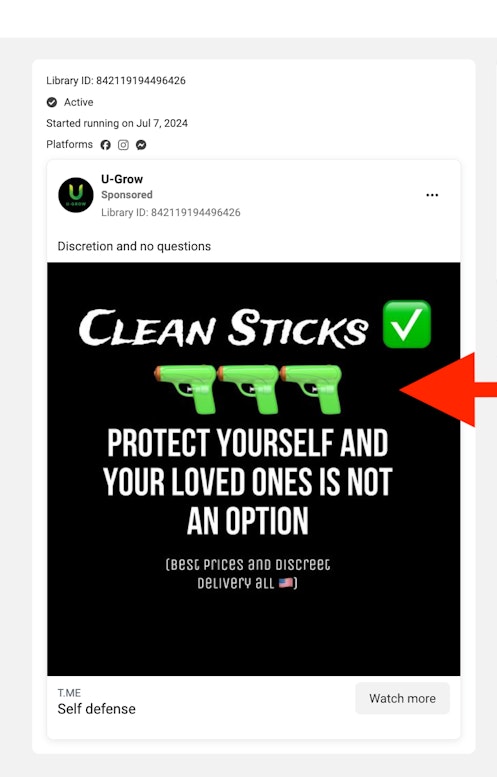
Glocks for sale
A total of 107 ads identified in this investigation offered Glock pistols, which Everytown has called the “leading weapon of choice for criminals” due the frequency with which they’re recovered at crime scenes. These ads made clear in their text or images (or both) that they were selling Glocks. Nine of the advertisers identified by the study even had the word “Glock” in their page or account name.
One ad that ran in early October 2023 on Facebook, Instagram, and Messenger, read, “ALL GLOCKS AVAILABLE ON TELEGRAM 🔥🔥” and linked to a Telegram channel that promised “Discreet shipping.” The Telegram account offered a variety of Glocks and other firearms for sale including AR-15 rifles and submachine guns, giving prices for each.
The ad included a variety of hashtags including #usa, #2namendment, #gunsandgirls, and #reels, that appeared to be aimed at boosting the ad’s reach on Instagram. The Facebook page behind the ad, “Hakeemstrap99 Glock home,” made no secret of its business, stating, “We Supply all kinds of Weapons, from #Beretta, #Glock, #Pistol #Ammo etc.” The page, which described itself as a Delivery and Reservations service, linked to the same Telegram account described above.
One ad that ran on Facebook, Instagram, and Messenger in October 2023 pointed to a Telegram channel for Glocks.
One ad that ran on Facebook, Instagram, and Messenger in October 2023 pointed to a Telegram channel for Glocks.
This ad clearly violated Meta’s advertising standards, which say ads cannot “promote the sale or use of weapons, weapon modification accessories, ammunition or explosives.” Facebook’s Community Standards also prohibit “attempts to buy, sell, or trade, firearms, firearm parts, ammunition, explosives, or lethal enhancements” unless they come from “legitimate brick-and-mortar entities” that sell such products off Meta platforms. The Facebook page in this case, which offered guns as well as “cloned cards,” did not appear to be a legitimate business. (Cloned cards use stolen credit card data.) Meta says ads must adhere to both its advertising policies and the policies of the individual platforms where they appear.
Because this ad ran in the European Union, Meta provided data about the ad’s reach in EU countries in accordance with the transparency requirements of the Digital Services Act. The Meta Ad Library shows the ad reached 1,044 men aged 18 or older in France, Germany, Ireland, and Italy, giving a window into how Meta platforms help gun sellers target potential customers. (Meta does not provide reach data for ads outside the EU and in fact deletes records of non-EU ads once they are no longer active, with the exception of ads about politics, elections, and social issues.)
Another ad that started running on Facebook and Instagram on June 13, 2024, read, “GLOCKS FOR PROTECTION ONLY” and showed an image of a child holding what appeared to be a realistic-looking toy gun. The ad displayed a button to contact the seller via Messenger. The Facebook page behind the ad, called “Shotting Iron for protection,” had a Glock as its banner image, showed multiple photos of guns, and linked to a website selling Glocks as well as Beretta 92FS and Mini Draco semiautomatic pistols. The site tells buyers to contact the seller via WhatsApp, Meta’s encrypted messaging platform.
Another Glock ad that ran on Facebook and Instagram in June 2024 gave a way to contact the seller via Messenger.
Another Glock ad that ran on Facebook and Instagram in June 2024 gave a way to contact the seller via Messenger.
The investigation also identified a series of Instagram ads in June 2024 that featured an identical photo of Glock pistols and cases. The ads, run by three different accounts, directed users to the same Telegram channel. The channel offered a multitude of weapons for sale, including a Glock 43, Mini Draco, and MP5 submachine gun, giving descriptions and prices for each. The Telegram account prompted visitors to make orders via direct message.
Three Instagram profiles ran ads in June 2024 showing an identical photo of Glock pistols and cases and linking to the same Telegram channel.
Three Instagram profiles ran ads in June 2024 showing an identical photo of Glock pistols and cases and linking to the same Telegram channel.
Meta missed these obvious signs of gun sales despite saying it reviews ads before they run on Facebook and Instagram to check that they meet the company’s advertising standards. Meta says its ad review process, which is primarily automated, can take into account text as well as images and video and can also look the ad’s destination, or where it directs people.
Machinegun conversion devices
The investigation identified 34 Meta ads for devices known as auto sears or switches, which are used to convert semiautomatic handguns like Glocks into fully automatic weapons. Auto sears enable pistols to fire up to 1,200 rounds per minute, and U.S. government officials have called them a fast-growing threat to public safety. The illegal devices, which are relatively cheap and can be made using a 3D printer, are often referred to as “Glock switches” because they’re commonly used with Glocks.
Researchers identified one Instagram ad that ran in July 2024 with the text, “Ready to switch things up with my Glock 🔫 💥 Who’s in for some practice?” The ad, which used a series of hashtags including #GlockSwitch, showed a video of a hand digging into a pile of switches and a button to the seller’s Instagram profile. The profile linked in turn to a Telegram channel that had the word "Glock" in its name and sold Glock switches, Glock pistols, and a variety of other guns. (Other firearms for sale in the channel include B&T APC and Mac-10 submachine guns.)
The Telegram channel had a pinned post that stated, “We offer domestic and international shipments of an excellent variety of firearms,” and boasted about its “diplomatically sealed” and “stealth” packaging.
An Instagram ad from July 2024 showed a video of switches, which are small devices that can convert a handgun into an automatic weapon.
An Instagram ad from July 2024 showed a video of switches, which are small devices that can convert a handgun into an automatic weapon.
As noted previously, Meta’s advertising standards prohibit promoting the sale or use of “weapon modification accessories,” including “products that might be attached or used with a weapon to enhance or customize its form or function.” Instagram’s Community Guidelines, which also apply to the above ad, do not specifically address weapons modification, but they do tell advertisers they must “follow the law,” which would presumably rule out ads for illegal Glock switches.
The investigation identified one Meta advertiser called “Glock Automaticsear” that has run multiple ads openly selling Glock switches over the past year. One of the ads, which ran for nearly four months between October 2023 and January 2024 on Facebook, Instagram, Messenger, and Meta’s Audience Network, showed a handful of switches with the words “Hot Sale.” The accompanying text said the devices were made of “high-quality stainless steel material” and available via “authentic shipment.” The ad linked to a website called automaticsear.com that is no longer active.
Another ad from the same account that ran on all four Meta platforms in August 2023 promised “free shipping” for switches made with “precision craftmanship.” It linked to the same automaticsear.com site. The Ad Library showed that Meta removed three ads from “Glock Automaticsear” for violating its advertising standards, but it’s not clear why the company allowed the others to proceed, given that they were all clearly selling switches.
A Meta advertiser called “Glock Automaticsear” ran multiple ads openly selling switches over the past year.
A Meta advertiser called “Glock Automaticsear” ran multiple ads openly selling switches over the past year.
The investigation also identified a pair of ads that mixed hate symbolism with policy-violating gun content. The first ad, which ran on Instagram starting on July 30, 2024, showed a photo of switches lined up on a table, including some emblazoned with a swastika symbol associated with Nazi Germany. The ad linked to a Telegram channel that sold Glocks pre-affixed with switches plus other weapons. About two weeks later, another Instagram ad showed the same photo of Nazi switches and linked to the same Telegram account.
(While these ads contained a known hate symbol, it is not clear if they violated Meta’s advertising policy on hate speech. That policy prohibits attacks on people on the basis of race, ethnicity, religious affiliation, and other protected characteristics but does not specifically mention hate symbols. Facebook’s Community Standards and Instagram’s Community Guidelines also lack specificity on hate symbols.)
One Instagram ad that ran in July 2024 showed switches emblazoned with a swastika symbol.
One Instagram ad that ran in July 2024 showed switches emblazoned with a swastika symbol.
Assault rifle ads
Several of the Meta ads identified by researchers pointed users to AR-15 style assault rifles, which are known as the weapon of choice for mass shooters. Such guns fire high-velocity rounds that can “eviscerate multiple people in seconds,” according to an explanatory article published this year by the Washington Post.
One Instagram ad, which ran from May 8 to May 14, 2024, showed a mountain bike with a rifle mounted on the handlebars. The ad linked to a Telegram channel that had the words "Glock" and "AK47" in its name and offered “Worldwide shipping 🌎✈️.” Inside the channel, the seller’s offerings included a Daniel Defense DDM4, a type of AR-15 style rifle used by the shooter who killed 19 children and two adults in Uvalde, Texas in May 2022. The channel offered other semiautomatic rifles including a Smith & Wesson M&P15 and Colt LE6920.
Because this ad ran in the European Union, Meta provided data showing that it reached more than 15,500 adults in EU countries (specifically the Netherlands and Portugal). The Telegram channel linked in the ad appeared to tailor its sales efforts to a European audience, often giving prices in euros. For example, the channel offered the Colt LE6920 for €885 and a Kel-Tec SUB-2000, a gun known as a pistol-caliber carbine, for €700.
This Instagram ad from May 2024 showed a mountain bike with a rifle mounted on the handlebars.
This Instagram ad from May 2024 showed a mountain bike with a rifle mounted on the handlebars.
The Instagram profile behind this ad has advertised weapons on multiple occasions. Another of its ads that ran from May 31 to June 29, 2024, showed a handgun propped up against a pile of black cases and linked to the same Telegram account mentioned above. The ad reached 67,000 users in Portugal and Spain before it was removed by Meta’s systems for violating advertising standards. However, Meta did not disable the Instagram profile itself, which remained active offering guns for sale. (The Washington Post reported in 2022 that Facebook gives gun sellers 10 strikes before kicking them off the platform, which Meta did not dispute.)
Another January 2024 Instagram ad from an account called “cali_gunna” showed an image of a Daniel Defense rifle and linked to a Telegram channel. The same account ran an Instagram ad a few days later that offered Micro Draco pistols. Meta’s Ad Library indicates the account behind the ads was later disabled for not following the company’s advertising standards.
The same account ran another Instagram ad showing a handgun propped up against a pile of black cases.
The same account ran another Instagram ad showing a handgun propped up against a pile of black cases.
Ghost guns
The investigation also found a number of ads explicitly offering so-called ghost guns or pointing to Telegram and WhatsApp channels that sell such weapons. Ghost guns are homemade firearms made from do-it-yourself kits or 3D-printed parts. They do not have serial numbers, making them nearly impossible to trace, and are proliferating across the country, according to law enforcement officials. (The ATF issued regulations for ghost gun components in 2022 designed to treat them like traditional firearms, though the rules have been challenged in court and are due to be taken up by the Supreme Court.)
One Instagram ad from the profile “ghost_fire_arm345,” which started running on July 31, 2024, directed users to a Telegram channel that had "Ghost" and "Firearms" in its name. A video posted in the channel, which panned over a collection of pistols, stated, “ALL OUR GUNS ARE BRAND NEW (GHOST GUNS)” and “DON’T CARRY SERIAL NUMBERS ON THEM.” The channel’s offerings included a “Ghost Glock 45 and Glock 20” for $400. Another post indicated the seller accepts payments via Cash App and Apple Pay.
In a similar example, an Instagram ad from “ghost_arm654,” which started running on Aug. 11, 2024, pointed users to a Telegram channel that gave prices for a variety of “Ghost Glocks” for sale.
An account called “ghost_fire_arm345" ran this Instagram ad in July 2024.
An account called “ghost_fire_arm345" ran this Instagram ad in July 2024.
Meanwhile, an Instagram ad that ran from May 9 to May 15, 2024, featuring the same video described earlier in this report of a hand digging into a pile of switches, led users (via a bot) to a Telegram channel with the word "gunfire" in its handle. One post in the channel offered a “Ghost Glock👻”—specifically a Glock 17 pistol—for $600, describing it as “Fully UNSERIALIZED and impossible to trace.” Another post offered a used “Ghost Glock 22Gen 4,” with a laser sight and 50-round drum magazine, for $450. (Drum magazines are ammunition-feeding devices that allow shooters to fire more bullets without reloading.)
The ad was one of three identical versions that ran between May and August 2024, according to Meta’s Ad Library. While a May version was removed by Meta for advertising violations, an August version ran without any intervention.
This video ad from May 2024 offered illegal switches.
This video ad from May 2024 offered illegal switches.
Telegram and WhatsApp
A total of 157 ads identified in this investigation linked to Telegram channels that act as digital storefronts for buyers to purchase a gun.
Meta allows ads as well as Facebook and Instagram accounts to link directly to Telegram despite the platform’s well-known reputation as a hub for illicit activity. (That reputation gained new attention last month when French prosecutors charged Telegram founder Pavel Durov with complicity in the spread of child sex abuse images and other crimes.)
But not all of the ads identified in this investigation pointed to Telegram. Researchers found that dozens of the ads directed viewers to WhatsApp—an encrypted app owned by Meta itself—to make weapons-related purchases. That means prospective buyers never had to leave Meta’s ecosystem to complete a transaction.
For example, an ad that started running on Facebook on June 22, 2024, with images of ammunition magazines and pistol slide back plates, linked to a WhatsApp business account for “Tactical Accessories On Line.” The account displayed a catalog of gun parts including magazine extensions for Berettas, Glocks, and other firearms.
WhatsApp says business accounts that use the catalog feature must adhere to Meta’s commerce policy, which prohibits the sale of weapons and weapons parts including “ammunition components.”
Another ad from “Tactical Accessories On Line,” which starting running on July 23, 2024, offered magazine extensions for brands including Beretta and Taurus and linked to the same WhatsApp business account. The words “Beretta” and “Taurus” were slightly misspelled in the ad with an “@” in place of the letter “a,” likely to avoid detection by Meta’s automated systems. The Facebook page behind the ad gave its location as Honduras.
A Facebook ad that started running in June 2024, showing ammunition magazines and pistol slide back plates, linked to a WhatsApp account.
A Facebook ad that started running in June 2024, showing ammunition magazines and pistol slide back plates, linked to a WhatsApp account.
The investigation also identified two Instagram ads from an account called “Warzone.ts” that ran in July 2024, showing a Glock pistol equipped with a collapsible stock. The ads linked to the account’s Instagram page, which tells users how to place orders via WhatsApp. As with the previous example, the WhatsApp account was a business account offering a catalog of weapon accessories for sale. The catalog featured gunstocks, scopes, pistol grips, and other items prohibited by Meta’s commerce policy. The Instagram page calls itself a “tactical store” and says it delivers “all over Lebanon.”
Meanwhile, an ad from “katta pistol” that started running on Facebook, Instagram, and Messenger on July 29, 2024, showing someone carrying a rifle, had a button to message the seller via their WhatsApp business account. The manager of the Facebook page behind the ads gave their location as India.
Two Instagram ads from July 2024 showed a Glock pistol equipped with a collapsible stock.
Two Instagram ads from July 2024 showed a Glock pistol equipped with a collapsible stock.
It is not clear why Meta failed to catch these repeated violations. WhatsApp states that “[e]very image uploaded to the catalog is subject to a review.” But the end result in these cases is that Meta may profiting twice off policy-violating gun content: once from an ad and again from the WhatsApp account’s interactions with buyers. WhatsApp charges business accounts for different kinds sales and service “conversations” with customers.
The above examples all involve accounts in other countries, which tracks with WhatsApp usage generally. The messaging platform has an extensive international user base and is far more popular outside the U.S.
Other languages
The investigation identified other Meta gun ads in foreign languages, underscoring the international nature of this activity. The ads all had the English word “Glock” in the name of the account or the ad text.
For example, one ad that ran on Facebook, Instagram, and Messenger on Oct. 17, 2023, from an account called “Glocks,” stated, in French, “We do not encourage violence. Weapons used for protection.” The ad listed various firearms including a Glock 45, a Smith & Wesson M&P22 semiautomatic pistol, and a Beretta BX1 rifle, and gave a way to contact the seller via Messenger. The Meta Ad Library shows the ad reached 500 users in Belgium, France, and Martinique.
Another Instagram ad that started running July 8, 2024, offered, in Arabic, a “100-round magazine” and showed images of drum magazines. The ad linked to an Instagram profile called “glock_store_yaman,” which calls itself a “Glock Store for hidden military missions” and gives an address in Sanaa, the capital of Yemen. The profile was full of photos and short-form Reels videos of handguns and rifles. Many of the posts directed users to the store’s address in Sanaa. (Yemen has experienced years of civil war that has left more than 150,000 people dead.)
A Facebook ad that started running on June 23, 2024, stated, in Indonesian, “I’m hunting for 🐷🐷🐷 use Glock 19,” and showed a video of someone raising a pistol and shooting a wild boar dead at close range. The Facebook page behind the ad, called “sporting goods shop” in Indonesian, was filled with photos of firearms for sale. The page, which gave its location as the Indonesian province of East Java, stated that “we always provide the best at cheaper prices, safe packaging, speed of delivery and accuracy, because customer satisfaction is our goal!” The ad linked to a WhatsApp account.
One ad in French that ran on Facebook, Instagram, and Messenger in October 2023 gave a list of firearms and a button to contact the seller via Messenger.
One ad in French that ran on Facebook, Instagram, and Messenger in October 2023 gave a list of firearms and a button to contact the seller via Messenger.
Algorithmic test of Instagram and kids
In a May 2023 report, TTP documented how YouTube recommended hundreds of videos about guns and gun violence to accounts for boys interested in video games, raising questions about algorithmic safety on the platform. YouTube’s algorithms steered the young gamers to scenes of school shootings and instructions on how to use and modify weapons, among other dangerous and disturbing content.
TTP set out to conduct a parallel experiment with Instagram, to examine whether the photo-sharing site had similar issues with its algorithms pushing gun content to minors. As with the YouTube study, TTP created test accounts for teen gamers and examined what Instagram’s algorithms recommended to the hypothetical minors. However, the research found that Instagram did not fall into the same trap as YouTube and completely avoided recommending gun content to the young gamers. This suggests that Instagram has put some guardrails around its algorithms to ensure that they avoid leading minors toward inappropriate material about firearms—a laudable result and one that could serve as a model for other tech platforms.
For the Instagram experiment, researchers set up a pair of Instagram accounts for hypothetical 16-year-olds. The test accounts followed a series of video game-related accounts to establish them as gamers. One acted as an “engagement” account that followed and clicked on accounts recommended by Instagram under the “Suggested for you” tab. The other acted as a “passive” account that did not interact with Instagram’s recommendations. (See the full methodology at the bottom of this report.)
Researchers collected and analyzed Instagram’s recommendations to the test accounts at specific intervals over a 40-day period and found that Instagram’s algorithm did not push gun content to the teen gamers at any point during the experiment. By contrast, TTP’s earlier YouTube experiment found that YouTube regularly recommended content about guns and gun violence to accounts for young gamers—and at a much higher volume to the accounts that engaged with the YouTube-recommended videos.
(In the wake of TTP’s YouTube report and pressure from Everytown and Manhattan District Attorney Alvin Bragg, YouTube made changes to its firearms policy in June 2024, saying it would age-gate content about homemade and automatic guns and some gun accessories for users under 18. However, follow-up research from TTP in August 2024 found that YouTube had failed to implement the new restrictions.)
Conclusion
TTP's research on Meta platforms provides a mixed picture on gun content. The investigation found that the company approved and profited from hundreds of ads for guns and gun accessories that violate its own policies. Meta also appears to be profiting from WhatsApp business accounts that offer weapons for sale. That raises serious questions about Meta’s ability, or willingness, to enforce its own content standards around firearms.
At the same time, Meta’s Instagram showed that it can put guardrails around gun content when it comes to algorithmic recommendations. Those guardrails are promising. But until Meta does a better job of rejecting gun advertising that violates its policies, the company will continue to serve as a giant online bazaar for black market weapons.
More on Instagram methodology
For this experiment, TTP created six personas, each with a unique email account used to set up accounts on Instagram. Each persona operated on its own virtual machine with its own IP address and its own mobile SIM card so that the algorithms were not influenced by other activity.
The six personas were split into groups: Three accounts used a birthdate from 2008 to identify as teens, and three accounts used a birthdate from 1990 to identify as adults. (None of the accounts specified a gender.) In each group, one account served as a “passive” persona that showed an interest in video games but did not engage with recommended content; another account served as an “engagement” persona that showed an interest in gaming and followed and clicked on recommended content; and another account served as a “control” persona that showed no interest in gaming. This allowed researchers to explore whether engaging with recommendations drove users toward gun-related content.
All six personas followed a set of Instagram accounts and hashtags to establish their interests. The passive and engagement accounts searched on Instagram for a series of terms derived from the 2023 top-selling video games in the U.S. The control accounts searched for terms derived from the 2023 top streaming shows on Hulu and Netflix. The personas followed the top three accounts and hashtags that came up in the search results for each term (provided they had more than 100 followers or posts). Researchers then recorded all of the “suggested for you” accounts that Instagram recommended to each profile to follow.
After 10 days, the engagement personas in each group followed all the new accounts recommended by Instagram. Researchers recorded Instagram’s “Suggested for you” accounts for all the personas as well as any suggestions that popped up when the engagement personas followed an account. After 20 days, the engagement and passive personas searched Instagram for additional terms derived from the top ten gaming influencers of 2023 and the top three streamed games of December 2023 that had more than 100 million hours streamed. For these personas, researchers followed the top three accounts that came up in the search results for each term and “liked” the most recent post in each followed account.
After 30 days, the engagement personas in each group followed all the new accounts suggested by Instagram as well the suggested accounts that were recorded during the day 10 intervention when the engagement personas followed an account. Researchers then captured Instagram’s suggested accounts for all personas as well as any suggested accounts that popped up when the engagement personas followed an account. Researchers did a similar intervention after 40 days.
Following the conclusion of the experiment, researchers examined whether Instagram pushed any weapons-related content to the accounts.

